#if you want a more nuanced depiction of the event then you can’t focus on the news. imo. like the set up is wrong
Explore tagged Tumblr posts
Text
I thought this was a really interesting review! The movie is very much a process thriller and my partner & I noticed the lack of context and the rigorous adherence to just covering the coverage in the film, with only the barest acknowledgments of context. The film did acknowledge what it called the Jewish Arab conflict but didn’t go into detail. This review points out that this lack of context and the apolitical approach is very political and is pretty emblematic of american tv news. So true.
I think, though, what is noticeable is that the film is more interested in how the way we cover news was born than why it is this way, like, the crisis happened and the news room reacted and ratings were high so it kept happening. That is the how. The “why” is just not something the film is interested in! Which in and of itself is really interesting. The film takes the apolitical viewpoint the tv media often uses and reproduces it by training it on the news itself. This review is arguing that this tactic condones the viewpoint…but I almost feel like it actually calls it into question in a more successful way. To make it so noticeable that you can’t ignore it.
Maybe feeling hollow is the point.
#anyway it’s a good review! read it#I did like the movie#on the way home I was trying to figure out how the film could be less apolitical#but I think it would be at odds with the film’s goal#which is to adhere to the actual coverage#now! if we want to discuss IF that should be the goal—different conversation#do we want to discuss history or do we want to reproduce history? which is to say do we want to reproduce the news coverage?#if you want a more nuanced depiction of the event then you can’t focus on the news. imo. like the set up is wrong#I also see a lot of discussion of this movie as propaganda which is also interesting but is also a different conversation#god the production design was so cool
0 notes
Text
Dramione Recommendations
Ok so, 2020 has been A LOT but on a personal note one of the most surprising things to happen was me discovering Dramione fanfiction and becoming unashamedly obsessed with it. I really didn’t see that coming but I’m here now and I’m here to stay.
I think I started reading in the Dramione fandom around mid July last year?? (In all honesty I’ve lost any true sense of time’s progression at this point so I could be well off the mark with that) And I’ve decided to compile a list of all my favourite fics I’ve read so far. Why? I really just want to gush over all the amazing writers I have found through this fandom because y’all deserve it.
Side note: If any of the authors actually sees this post just dm so I can buy you coffee or post you writing supplies or something idk I feel like that’s the least I can do for all your amazing work x
Remain Nameless by @heyjude19-writing
Ok I have to start with RN because this fic is pretty much the sole reason I decided to create an account with A03 or a tumblr or just decided to get involved with this fandom at all.
I headcannon this story hard. But I think even if you aren’t a fan of Dramione you should just read this because it is so unbelievably good and well written and poignant and Draco’s sarcastic personality in this is truly a thing of beauty in this - I relate to his inner monologue’s on a deep personal level.
I could rave about this story any time, any day of the week, just ask me. In fact, maybe I’ll just start a HeyJude19 fan club to fulfill that urge.
There are so many elements that I love but for the sake of brevity, RN is a beautifully told story of Draco and Hermione finding love and healing in a post-war HP setting. Heyjude19 had the very special ability of making me want to simulatenously laugh, cry and swoon with the power of her words. Just stop what you are doing and go read it now if you havent already, ok?
I also really enjoyed reading Bells on a Hill, Beers, Potions and Unwise Notions and A Shift in Focus, if you are looking for smaller fics, definitely give these a go. They are all funny and heartfelt stoires that will make your tippy toes wriggle with glee.
The Rights and Wrongs Series by @lovesbitca8
The Right Thing To Do, All The Wrong Things and The Auction are the holy trinity of Dramione writing. I have christened it thus, so mote it be. And frankly I’m not interested in any other opinion than that one, thank you very much!
After reading this series I don’t think I’ll be able to look back on the orginal HP books without thinking of Hermione’s and Draco’s memories of their time at Hogwarts in these fics as anything other than strictly cannon.
So many things to love about this series but I think one of the major highlights was Hermione and Draco’s use of occlumency. LoveBitca8 created such beautiful visuals with how occlumency works as a magical practice and seeing Draco and Hermione so devoted to eachother to the point of safeguarding their inner most feelings to protect eachother was unbelievably romantic and poetic.
Also the smut is divine ;)
Manacled by @senlinyu
My heart will never be the same after reading this story. Like I actually can’t think about this fic without getting a lump at the back of my throat. I have never felt so emotionally ruined after reading anything, compared to the likes of this fic. Just please, please read it. To badly quote HP, reading Manacled will make you suffer but you’re going to be happy about it.
The flashbacks are a rollercoaster in of themselves but the way Hermione inadvertently refers to them when she is still in a state of memory loss was so heartbreaking to read. My heart still aches for them both. Also its a truly satisfying to see Draco and Hermione written in a way were they are both so fiercly protective of one another. They make my insides go soft.
I also really enjoyed Snow Fall, Now Is A Gift and All You Want by the author but to be honest anything written by Senlinyu is always thoroughly enjoyable and worth a look.
The Erised Effect by @adaprix
Ada is QUEEN of dramione smut but ‘The Erised Effect’ is top tier. Its equal parts funny, romantic, sentimental and oh so sexy. Ada really knows how to build and build on sexual tension and doesn’t disappoint on the final delivery. I’m a big admirer of her writing style and just veraciously read whatever she posts but ‘The Erised Effect’ is just golden. A must read. (Also Pansy’s sexual fantasy in this story is a visual I don’t think I’ll ever be able to remove from my brain so thanks for that Ada)
Also quick side note: Adaprix’ stories were the first I read when I was looking into this fandom and it was enough to get me hooked on the pairing from the get go so I have that to thank Ada for too. I remember devouring all the stories she had posted to A03 and when I was done I was like... now what am I supposed to do with my life?? And that’s basically when I began to look deeper into the fandom and thus the course of my life in 2020 changed for the better.
Some other stories I love by her are Break for Me, All My Sins, The Big 4-0, The Fucklust Series and The Flat in Bath.
Clean by @olivieblake
This 6th Year AU where Draco and Hermione work together on a class assignment and end up falling in love had me feeling all kinds of ways when I read it. I almost don’t know where to start but I think one of the stand out things for me was how immersed I felt in reading it.
Hogwarts is captured really well, you get a good sense of class atmospheres, character nuances and behind the scenes of events that happen in HBP but from a Draco and Hermione’s perspectives. It’s well executed and intricate tapestry of a fic. With an excellent plot twist ending!
Also Hermione and Draco’s relationship in this is equal parts fluffy and smutty and it just ticks all the right boxes that you want to see for those characters ;)
Breath Mints / Battle Scars by @onyx-and-elm
The angst in this one is just *chef’s kiss*
God I love this fic. The way Draco is portrayed is very true to his defensive and tetchy character in the original books but he is also given so much more depth. The way his diary entries are written are just so well executed. It’s a true testament to the author’s creative writing skill. And I LOVE how even though Draco is clearly in such a messed up place, he still has a basic level of self respect and dignity that he won’t tolerate being used or undervalued in his relationship with Hermione.
Yep, I really love Draco’s characterisation in this one if you can’t tell. But Hermione is also well written too. Her stuggles and trauma of returning to Hogwarts after war is described in a believable and grounded way. And my heart definitely ached for them both. I just wanted to wrap the pair of them in a big fuzzy blanket and tell them that everything will be alright.
WANDS OUT! by @persephonestone
This murder mystery / Dramione / Theo x Harry / AU crossover is everything I didn’t know I wanted until I read it. I felt like I was picked up and plonked right into an alternative dimension where all the characters of HP are just living it up in an Agatha Christie novel.
It’s a funny and clever story that I found refreshing to read amongst all the other fanfics that are usually cemented in the HP timeline or universe. Theodore Nott in this fic is perfection he should be written like this in every fic from now on in my opinion. I couldn’t stop giggling any time he had a scene in the story.
And the ‘only one bed’ trope in this fic is 10/10. I don’t want to give spoilers but ohmygod. It hits all the right notes.
The One With Technical Difficulties by cassielassie
Cassielassie has an excellent three part series of Dramone called ‘The One with...” but I have to give special credit to this story in particular for one main reason. ELEVATOR TROPES. I can’t get enough of em. I think I have my early childhood viewings of NCIS to thank for my obsession with elevator tropes they just do something to me that simply cannot be explained with mere words. The palpable sexual tension of being in a broken down elevator with an ‘enemies to lovers’ pairing, a heated arguement breaks out followed by a discovery of mutual feelings and a romantic embrace...
Eugh. It gets me everytime. And this fic is no exception. I loved it for all the reasons I’ve already stated above but also for the attention to detail in Draco and Hermione’s careers makes this one particularly immersive. The dynamics between them established in this one-shot are convincingly portrayed and the chemistry between them is so undeniably hot.
The Light is No Mystery by @masterofinfinities
Yooo if you want to read a dramione fic that is a deep dive into Pureblood culture and Post-War recovery but is also a perfect allegory for discrimination and today’s political landscape of moral grandstanding for votes then look no further than this one.
This story has a bit of everything. Intrigue, mystery, ptsd and recovery, enemies to lovers / secret relationship, government conspiracy and humour, to name a few. I eargerly await every update to this story and am anxious to know how it ends!
The Eagle’s Nest by HeartOfAspen
Finally! A fic that gives me the Ravenclaw representation I crave. I think I could recommend this fic on the lore depicted of Ravenclaw house alone. ‘The Stacks’ and Rowena Ravenclaw’s own ‘come and go room’ are just such cool details that I could see being real in the HP universe.
This fic is so cosy and makes me feel like I’m just popping back into Hogwarts for another year. You get to see all the usuals like prof. Mcgongall, Nearly headless Nick, PEEVES, Hagrid, as well as learn more about minor characters from the other school houses. The story follows Hermione going to her day to day classes and there are interesting concepts about magic and alchemy that are explored.
Draco and Hermione’s relationship in this one is of course very fluffy and heartfelt. But it’s the attention to detail that really makes this fic outstanding and the experience of reading it feels fleshed out and true to HP universe.
A shorter fic by HeartofAspen that I recommend is one called Set in Stone, it has an adventurous, Indianna Jones vibe to it, that I am so down for.
Teachable Moments by @purplesugarquills
In this fic Hermione is an innocent little virgin determined to learn everything about sex. And Draco Malfoy is her tutor. If that isn’t enough to get you on board then I don’t know what is. Both Heartfelt and Steamy. PurpleSugarQuills writes smut so well but it’s the progression of their growing attachment and the nervous treading of new uncharted waters of romantic relationships for both of them that just adds a whole other level of feels to the story. Also chapter 9 is like reading poetry - its so good. Eugh just give it a read if you haven’t already.
Les Pèlerins by @pacific-rimbaud
This story is high art. It’s transcendent. Reading this story feels like the emotional equivalent of standing around a hundred glowing fairy lights, sipping hot cocoa and being wrapped in the loving embrace of a s/o. I can’t speak my praises highly enough or even become passably coherent in my words when I try to articulate a review.
From the very first paragraph I felt like I was just whisked away on a Parisian holiday and I’ve never even bloody been to Paris but damn it if this story didn’t make me feel like I was there. The writing style is just so tactile and intense it’s like I could feel the cold winter air brush against me as I read it. Eugh I just completely fell in love with the story and the writer.
New Year’s resolution. Read everything PacificRimbaud has ever posted online.
#This post is the online equivalent of me thrusting a pile of books into your hands and poking at you until you every single one#A behaviour I may or may not already be prone to#dramione#fanfiction#fanfic recommendations#I think I may have missed a few but I think I'll try to make a habit of gushing over new writers as I find them#Doing this just satisfies a deep inner urge in me to just compliment the everloving shit out of writers#who made my life a little more bearable with their words
1K notes
·
View notes
Text
I think the problem with the “everything is political” debate is that different people mean different things by “political”
You have person A who thinks that something being political simply means “is influenced by or makes some sort of commentary on a real world event or issue.” By this metric, yeah basically every piece of media (and, by extension, basically everything anyone says or does throughout their life) really is political
But person B sees “political media” as meaning something more like “takes a firm stance on a controversial issue that is being debated by people and/or politicians currently,” essentially it’s telling you how to vote (which I think is the connotation most people get when they hear the word “political” but I could be wrong)
If person B says to person A “I hate it when shows get political, not everything needs to be political,” person A hears, “I want the media I consume to have zero stakes, show zero conflict, have no message, and no substance. I just want to live in a bubble and never think about the real world. I am either stupid enough to think that completely abstract media with no story or connection to reality is the most compelling, or malicious enough to think that a simple moral like ‘women have rights’ or ‘genocide is bad’ is unacceptable and should be opposed”
So person A responds with, “no, everything is political, and it should be,” and person B hears, “I need every bit of media I interact with to affirm all my political views at all times. Nuance does not exist, and depicting or enjoying something in fiction means you endorse it in real life. I am either so unconfident in my own stances that I can’t be exposed to the slightest criticism of them, or I am so narcissistic that I think no one should be allowed to consume or create content that I don’t agree with”
Both people have points (A: it can be enlightening to study the real-world influences of a work, and fictional works have been tools for helping people enact real-world change throughout history; B: people need to be able to separate fiction from reality, and they need time to be able to relax and not focus on real-world suffering constantly) but in this case neither person can engage with the other in good faith because what the other guy is saying means something different to you
5 notes
·
View notes
Text
MAD MEN BOOK RECS
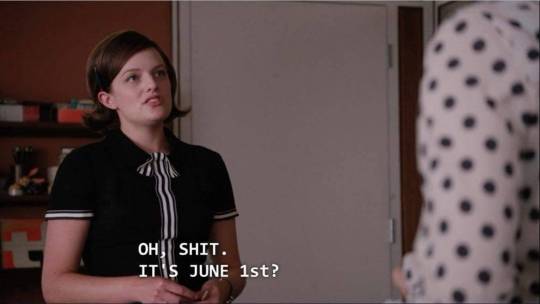
Happy pride/Don Draper’s fake birthday ❤️ Below the cut, I’ve listed info on my favorite Mad Men related books and a couple I haven’t read yet but I’m really looking forward to. Let me know if you check any of these out, or if you have any other recommendations! ❤️
Mad Men Carousel: The Complete Critical Companion by Matt Zoller Seitz
“Mad Men Carousel is an episode-by-episode guide to all seven seasons of AMC's Mad Men. This book collects TV and movie critic Matt Zoller Seitz’s celebrated Mad Men recaps—as featured on New York magazine's Vulture blog—for the first time, including never-before-published essays on the show’s first three seasons. Seitz’s writing digs deep into the show’s themes, performances, and filmmaking, examining complex and sometimes confounding aspects of the series. The complete series—all seven seasons and ninety-two episodes—is covered.
Each episode review also includes brief explanations of locations, events, consumer products, and scientific advancements that are important to the characters, such as P.J. Clarke’s restaurant and the old Penn Station; the inventions of the birth control pill, the Xerox machine, and the Apollo Lunar Module; the release of the Beatles’ Revolver and the Beach Boys’ Pet Sounds; and all the wars, protests, assassinations, and murders that cast a bloody pall over a chaotic decade.
Mad Men Carousel is named after an iconic moment from the show’s first-season finale, “The Wheel,” wherein Don delivers an unforgettable pitch for a new slide projector that’s centered on the idea of nostalgia: “the pain from an old wound.” This book will soothe the most ardent Mad Men fan’s nostalgia for the show. New viewers, who will want to binge-watch their way through one of the most popular TV shows in recent memory, will discover a spoiler-friendly companion to one of the most multilayered and mercurial TV shows of all time.”
A classic episode-by-episode look at the series from reviewer Matt Zoller Seitz.
The Legacy of Mad Men — Cultural History, Intermediality and American Television (Edited by Karen McNally, Jane Marcellus, Teresa Forde, and Kirsty Fairclough)
“For seven seasons, viewers worldwide watched as ad man Don Draper moved from adultery to self-discovery, secretary Peggy Olson became a take-no-prisoners businesswoman, object-of-the-gaze Joan Holloway developed a feminist consciousness, executive Roger Sterling tripped on LSD, and smarmy Pete Campbell became a surprisingly nice guy. Mad Men defined a pivotal moment for television, earning an enduring place in the medium’s history.
This edited collection examines the enduringly popular television series as Mad Men still captivates audiences and scholars in its nuanced depiction of a complex decade. This is the first book to offer an analysis of Mad Men in its entirety, exploring the cyclical and episodic structure of the long form series and investigating issues of representation, power and social change. The collection establishes the show’s legacy in televisual terms, and brings it up to date through an examination of its cultural importance in the Trump era. Aimed at scholars and interested general readers, the book illustrates the ways in which Mad Men has become a cultural marker for reflecting upon contemporary television and politics.”
This is a really beautiful collection. It was published in 2019. It’s rather expensive. (I found a used copy for much cheaper.) If you can afford it, I really, really recommend buying it. There is a pdf floating around if you know where to look though. But like I said, it’s really amazing work and the women who curated it deserve high praise and compensation.
A few favorite essays of mine include “Don Draper and the Enduring Appeal of Antonioni’s La Notte” by Emily Hoffman, “Mad Men’s Mid-Century Modern Times” by Zak Roman, “Mad Men and the Staging of Literature via Ken Cosgrove and His Problems” by Aaron Shapiro, and “What Jungian Psychology Can Tell Us About Don Draper’s Unexpected Embrace of Leonard in Mad Men’s Finale” by Marisa Carroll.
Mad Men and Philosophy: Nothing Is as It Seems (Edited by William Irwin, James B. South, and Rod Carveth)
“With its swirling cigarette smoke, martini lunches, skinny ties, and tight pencil skirts, Mad Men is unquestionably one of the most stylish, sexy, and irresistible shows on television. But the series becomes even more absorbing once you dig deeper into its portrayal of the changing social and political mores of 1960s America and explore the philosophical complexities of its key characters and themes. From Socrates, Plato, and Aristotle to John Kenneth Galbraith, Milton Friedman, and Ayn Rand, Mad Men and Philosophy brings the thinking of some of history's most powerful minds to bear on the world of Don Draper and the Sterling Cooper ad agency. You'll gain insights into a host of compelling Mad Men questions and issues, including happiness, freedom, authenticity, feminism, Don Draper's identity, and more.”
This collection was published just a month before the start of season 4, so it only concerns the first three seasons of the show. As such, it includes some assumptions that are proven false and a few strange misreadings that I’m sure would’ve been cleared up had they had the rest of the show at their disposal. But there are some great philosophical insights and analysis.
I haven’t yet read the whole collection, but my favorite essay of what I’ve read so far was “Pete, Peggy, Don, and the Dialectic of Remembering and Forgetting” by John Fritz.
The Fashion File: Advice, Tips, and Inspiration from the Costume Designer of Mad Men (by costume designer Janie Bryant)
From Joanie's Marilyn Monroe-esque pencil skirts to Betty's classic Grace Kelly cupcake dresses, the clothes worn by the characters of the phenomenal Mad Men have captivated fans everywhere. Now, women are trading in their khakis for couture and their pumas for pumps. Finally, it's hip to dress well again. Emmy-Award winning costume designer Janie Bryant offers readers a peek into the dressing room of Mad Men, revealing the design process behind the various characters' looks and showing every woman how to find her own leading lady style--whether it's vintage, modern, or bohemian. Bryant's book will peek into the dressing room of Mad Men and reveal the design process behind the various characters' looks. But it will also help women learn how fashion can help convey their personality. She will help them cultivate their style, including all the details that make a big difference. Bryant offers advice to ensure that a woman's clothes convey her personality. She covers everything from where to find incredible vintage clothing and accessories to how to pair those authentic pieces with modern shoes and jeans. Readers will learn how to find their perfect bra size, use color to convey a mood, and invest in the ten essentials every woman should own. And just so the ladies don't leave their men behind, there's even a section on making them look a little more Don Draper-dashing.
I recently ordered a used copy of this book and haven’t yet received it, but I’m very much looking forward to it. Like Mad Men and Philosophy listed above, it was published between season 3 and 4, so unfortunately does not cover the whole show. It sounds like it might just cover the women’s costume design, though I’m not sure. Janie Bryant is such a meticulous, genius costume designer that I can’t wait to read it. Relatedly, you should follow her incredible costume design instagram where she posts lots of her work from Mad Men and other shows with fascinating insight into her process.
The Universe is Indifferent: Theology, Philosophy, and Mad Men (Edited by Ann W. Duncan and Jacob L. Goodson)
Centered on the lives of the employees at a Manhattan advertising firm, the television series Mad Men touches on the advertising world's unique interests in consumerist culture, materialistic desire, and the role of deception in Western capitalism. While this essay collection has a decidedly socio-historical focus, the authors use this as the starting point for philosophical, religious, and theological reflection, showing how Mad Men reveals deep truths concerning the social trends of the 1960s and deserves a significant amount of scholarly consideration. Going beyond mere reflection, the authors make deeper inquiries into what these trends say about American cultural habits, the business world within Western capitalism, and the rapid social changes that occurred during this period. From the staid and conventional early seasons to the war, assassinations, riots, and counterculture of later seasons, The Universe is Indifferent shows how social change underpins the interpersonal dramas of the characters in Mad Men.
I only just found out about this collection, but I’m very interested in finding a copy. This was published in 2016. You can see the table of contents here. EDIT: This book is available to read on Scribd. They offer a 30 day free trial.
62 notes
·
View notes
Text
Loki ranting
Okay. I had this thought in my head of like just compiling links of all the Loki shit I've posted/reblogged so far so that when I get into a conversation about the show and how it fucking disgusted me, I can just be like "here. here's this masterlist post, go read all this shit. This is my entire argument, and not only mine, but a lot of stuff posted by people far more intelligent and level-headed and eloquent than I am, whom I happen to agree with." Because the alternative is constantly getting fired up all over again, and that is exhausting.
BUT! I'm stupid and don't know how tumblr works. Apparently I can't just be like "give me all the Loki-tagged shit I've got" I can only search all the Loki-tagged shit on all of tumblr. And I'm not scrolling back through all of my posts. I talk too fucking much for that shit 😂
So, I'll try to remember all of my grievances with how the MCU has treated Loki, and all of the excellent posts made by other, equally upset fans, and put it all together here under this nice, neat little cut for everyone else's sanity and scrolling convenience...
For people who actually read my shit fairly regularly - bless you, you crazy, patient people. I love you! - this is going to be a lot of repetition of shit you've already read. Probably at least twice. I'm passionate and I have a terrible memory lol. Sorry.
Anyway, first, for those who don't know me and haven't been following my explosions of rage for the past couple of months, some quick background: I do not read comic books, so Loki's Marvel comic canon means nothing to me. I know almost nothing about it. The reason I'm so in love with the character in the MCU is because I am an eclectic witch and the deity I've actively loved and worshiped the longest in my life (literally for as long as I can remember) is Loki. So when he was mentioned in The Mask, I squeed. When they named Matt Damon's character after him in Dogma, I cheered.
When Thor came out in 2011, I just about died from happiness. I was hungry for any representation of this underappreciated god, no matter what it was. I didn't even bitch about how underpowered he was, because at least he was there. But I'm getting slightly ahead of myself.
I can hear anyone reading this going "Why Loki? Isn't he, like, evil? Like basically the Norse version of The Devil?" Because I heard all this shit irl all the fucking time. And no. So let me give you a quick rundown of who Loki actually is.
Loki is a Trickster God. He's often referred to as the God of Mischief. He is not and never was evil, simply chaotic and hedonistic. Loki Laufeyjarson was the son of Laufey (that's mama; they changed her to a man for some reason in the movie) and Fárbauti. Right from the start, from his name, we get a sign of how Loki goes against traditional norms of the time, because in Norse culture, families were patrilineal, and surnames were "son/daughter of father" (which would have made him Loki Fárbautitason), not the mother. But Loki's surname is matrilineal. Feminist icon woo! lol
Though he's a Jotunn, Loki is counted among the Gods (Aesir) in Norse tradition. Depending on his mood, he is alternately helpful or disruptive to the other Gods. I'm not gonna sit and teach a whole text class on him lol but I'll use my favorite example of Misunderstood Loki - the conception of Sleipnir!
So, get this shit. This is also part of why I DO NOT follow Odin and never fucking will (a very small part, but still part of the reason). So, the other Norse Gods are petty motherfuckers, and they wanted some shit built but didn't want to pay the dude doing the building. So they were like "okay, if you can get it done in X amount of time, we'll pay you, but if you can't manage it NO MATTER WHAT, this whole thing is free." And they made sure he had NO help, nothing but him, his materials, and his Very Good Horsey. And this guy and his horse were fucking BAMFs. So it was looking like he was definitely gonna get it done in time, and Odin was like "nah, fuck that shit. I'm cheap." and so he sent Loki to distract the work horse. Loki transformed into a mare and lured the horse away, got fucked, got pregnant, gave birth to the 8-legged (for some reason) horse Sleipnir. Odin rides Loki's son into battle. Um. Kay.
So Loki helped Odin be a petty mf, and Odin got himself a new pet out of the deal.
Oh, also, because he's smart af and a shapeshifter and a master magician and genderfluid, Loki "fails" to fit the super fucking toxic and narrow Norse/Aesir view of "a real man". He prefers intelligence and manipulation to solve problems rather than violence, he's not afraid to behave like a clown if it gets shit done, and that grosses the Aesir out, so they constantly ridicule him for being "less than a man".
Loki is the God of the outcast and the misunderstood. The marginalized people from all walks of life. He is the God of the LGBT community. In modern terms, he's pansexual, polyamorous (married to Sigyn and they are deeply in love, but boy gets around and I've never seen any indication that Sigyn gives a shit) and genderfluid.
Okay. Focus, Ali. This is part of why I usually post multiple rants instead of one big long one XD The longer I ramble, the more I get sidetracked and forget the original point.
So. Loki's awesome, and being a Trickster, is powerful as all fucking hell. There's not much he can't do.
And now we come to Thor (the movie, not the deity). Loki's there! 24-year-old Ali is spazzing! All is right with the world!
Oh lord, they've actually done him justice?! Amazing! He's complex and nuanced and emotional, just like the real Loki! I loved this movie. Loved. It. The climactic thing with trying to blow up Jotunheim never really made much sense to me until someone made an excellent point the other day about Loki being raised in a racist society that was racist against his own race, he just didn't know it yet, poor child. Baby Thor was never corrected when he pledged to commit mass genocide, so Baby Loki probably absorbed the lesson then that Jotunns=evil and killing them all will win his father's love. Anyway, 2011 Loki was a beautiful, heartbreaking portrayal of the God I've loved all my life and spent 24 years longing to see depicted on the big screen.
Then The Avengers happened. And I saw another Loki very close to Norse mythology - mainly, how he's treated. In the beginning of the movie, he's sick, exhausted, and in pain. He can hardly stand, he stumbles and needs help when he walks. He was very obviously tortured, and the sickly blue light of the scepter's control is in his eyes. That gets less and less pronounced as the movie goes on, showing Loki working his way free of it, but in the beginning, he's a mess. Because he was tortured and used by Thanos. Marvel directly confirmed this, and that he was under the scepter's/Mind Stone's control. Loki's actions are not his own in The Avengers. He's under both threat and Thanos' direct control. The movie actually shows The Other directly threatening him to keep him on task, because this is not Loki's plan. It is not what he wants. He's being used and villainized... Just like in real life. It hurt to see this done to him, but the accuracy was too beautiful to ignore.
Thor: The Dark World comes out. I've heard people complain that this movie is the weak link in the Thor trilogy. I disagree. I think that's Ragnarok, for a bunch of reasons, but we'll get there. (And for the record, I loved Ragnarok, too. It was a funny movie. Infinity War and the Disney+ series are the only portrayals of Loki in the MCU that I truly fucking hated.) Anyway, good, fun movie. Had its faults, as all movies do, but it still followed Loki's real-life arc in a way. How? By having Loki dragged back to Asgard in chains and imprisoned underground. Again, not super happy that this happened to my love, and having to see it on screen was painful, but at least in the MCU he's not chained to a rock with venom dripping on his face for eternity, so there's that. (poor Sigyn. how tired do her arms get, holding up that bowl? best wife ever, amirite?)
In TDW, we're shown Loki's love for Frigga, who favored him and taught him magic as a child. We see his bravado; his attempts to mask his true feelings, especially grief. We see him slowly coming back to himself after the events of The Avengers, and slowly mending his relationship with his brother. He accepts that Odin will likely never love him, but Thor just might, because they were close when they were young. "I didn't do it for him." No, no my sweet, you did it for your brother, and a little out of guilt for what happened to your mother.
At the end, Loki fakes his death and escapes, taking the throne, and I have mixed feelings about this. Not the writer's choices here; I love that completely! A natural progression in Loki's story. But my joy is tainted by how closely they're following the Eddas now. Because Loki's escape from his prison heralds the beginning of Ragnarok. And Loki will die in Ragnarok. I don't want to see that play out in front of my face. I won't be able to handle the grief (spoiler alert! IW broke me. I almost walked out of the theater. Loki's death was legitimately fucking traumatic for me. I don't even care how pathetic that is. That grief was real, it was intense, and I still shake and cry when I think about it.)
Marvel announces that Thor 3 will be called Ragnarok. The internet treats this as a shocking revelation. I roll my eyes and mumble "duh" to myself and move on XD
Then they say Ragnarok will be a buddy comedy. I throw up a little in my mouth and no longer want to live on this planet. If they're going to make something called Ragnarok, could they at least treat it with even a fraction of the respect they've shown these characters thusfar? Jfc. I mean, I'll see it anyway, because I'm a whore for Tom Hiddleston lol. But come on, people!
I hated that they made Hel the long-lost older sister and Fenrir her fucking pet/attack dog. Those are my favorites of Loki's children! Hel is such an incredible badass that the early Christians named their dimension of eternal torture after her! They were terrified of her, to the point of naming the place that terrified them most after her. That's awesome! And Fenrir's just the best. I love wolves. Those two details, and Odin's retcon of "we're not Gods! ...lol, except your sister. she's totally a Goddess. and def gonna kill literally everything, so... good luck! byyyeeeee" pissed me off royally.
The rest was great. I genuinely liked this movie. Still do. And they finally used The Immigrant Song! That was pretty cool. If they'd thrown in Bring the Hammer Down and Thunderstruck, I might've called this movie perfect. XD
I wasn't totally in love with their portrayal of Loki in Ragnarok. Yes, the falling for 30 minutes line was funny, as was "I have to get off this planet" and "YES! That's how it feels!" And "Get Help" was funny as hell. But also, like... There is no way Loki would have been the dumb one in that first encounter with Hela. Also, he can teleport and project copies of himself and shit, so... He would not have been that desperate to go straight back to Asgard and bring her right along with them. Loki's not stupid. But whatever. Movie's gotta movie.
What I did love was seeing the slow mending of his relationship with Thor continuing, and the badass fighting on the bridge. I also loved that, like Real Loki, Movie Loki helped when help was needed, was quick and clever, and while he was carrying out the main plan, he was also planning ahead and grabbing the Tesseract. Yes, that drew Thanos right to them, but that's a whole other thing. Loki never would have left that thing on Asgard to be destroyed or lost.
And now Infinity War. Hooooly fucking shit. You know what? No. I'm not going into this. He was killed, years of character growth were erased forever, my heart fucking shattered. The end.
Endgame. IW hurt me so bad I didn't see Endgame until this year. I actually watched Civil War first (for context: I had actively avoided all Cap movies until this year because I fucking hate Steve Rogers. I find him insufferable. Did not realize what I was denying myself until I watched CW and finally saw the charms of Bucky. When he appeared in IW, I was so lost. XD I was like "...who dis? Murder Jesus?" also I just... didn't care. I was numb by then from crying through most of the movie over Loki)
So, anyway. Endgame. Loki picks up the Tesseract in alternate 2012, escapes, fans go "yay! he didn't actually die!" I go "yes he fucking did. Five years of his life, gone. Five years of growth and change, erased. Loki is dead. This will not be the same."
I was more right than I could have predicted. Now we come to the point of this rant. Sorry it took so long, but you were warned lol.
The Loki series makes me so angry I actually get sick to my stomach. It was fucking TRASH. When I praised Marvel for following Norse mythology so faithfully earlier? Yeah. I DID NOT MEAN TREAT HIM THE WAY THE OTHER GODS DID. I did not mean paint him as a pitiful clown, a joke, a caricature of who he truly was, with his pain and suffering played for LAUGHS.
This is supposed to be 2012 Loki, newly freed from Thanos' control. The Loki we saw in the beginning of TDW - snarky, exhausted, nihilistic. The Loki who rolled his eyes and said "get on with it" expecting to be killed.
The bumbling clown flipping on a dime from posturing to calling himself weak is not 2012 Loki. That is not ANY Loki. That is Tom Hiddleston in a black wig doing what he's told by a shitty writer who had no fucking idea what he was doing and was salty about his (bad) original script (for something totally fucking unrelated) getting killed.
In Episode 1, Loki is mocked, imprisoned, stripped against his will, tormented, belittled, and given a flippant summary of all the trauma Actual MCU Loki suffered that this one skipped out on, with no context, no acknowledgement of the trauma he's already lived quite fucking recently, and with the narrative twisted to not only erase all the abuse he's suffered, but to make it all his fault. And this is supposed to make him want to help these people?
And worse, IT FUCKING WORKS. WHAT?! I CAN'T- FUCKING WHAT?! Remember when I said LOKI IS NOT FUCKING STUPID?! So why is he STUPID?
Episode 2, he's a child. Mentally, this Loki is a fucking child. Now we've erased all the growth and development of his entire adult life. He's dopey, impatient, impulsive, desperate for a pat on the back and actually shows it. Yes, abused and neglected children crave the positive attention we never received, and we often grow up to be a bit emotionally stunted. But not all of us, and not Loki. Not as we've seen him EVER in the rest of the MCU. Playful and a bit callous at times? Absolutely! But not a big dumb fucking puppy.
Episode 3, a ray of hope, despite Sylvie! (I hate Sylvie) Loki casually admits he's pan/bi; labels never come up, but he admits to being with both men and women! He sings! Not really relevant to whether I approve of his portrayal or not lol but Tom has a beautiful voice, Norwegian ("Asgardian" lol) is a gorgeous, entrancing language, and I could watch that one bit on loop for eternity and never get bored. And then, finally, we see a glimpse - a glimpse - of Loki's power! He stops a falling building and pushes it right back up! Are we finally getting to see what he can really do? Will the next episode bring us Loki in all his glory?
Nope. 4 and 5 we see him mocked and pushed around and utterly irrelevant. Again. We see tiny reflections of what he could maybe theoretically do in other random Loki variants, but the "main" (lawl. main. it was the Sylvie and Mobius show. Loki was never the main anything.) Loki? Nothing. He wears his heart on his sleeve for no reason, bonds with the man who imprisoned, taunted, and gaslit him, is killed, and continues to be a moron and a joke. Always the clown. Always the dumb one. The one with the bad ideas. The inferior Loki.
Don't even get me started on that finale. I can't. This already took so much out of me. Fuck Marvel. Fuck this fucking show. I just... I'm done.
#loki#loki spoilers#loki series#loki negativity#loki hate#thor 2011#the dark world#ragnarok#the avengers#infinity war#endgame#fuck sylvie#fuck marvel#fuck disney#this show sucked#ragepost#rant#long post#ali is angry
38 notes
·
View notes
Note
If Anne R. decided to publish another VC book in the future, how would you like it to be? What topics would you like to see explored? What's your ideal ending to the saga? L̶e̶t̶'̶s̶ ̶i̶m̶a̶g̶i̶n̶e̶ ̶s̶h̶e̶ ̶w̶o̶u̶l̶d̶n̶'̶t̶ ̶s̶c̶r̶e̶w̶ ̶i̶t̶ ̶u̶p̶ ̶t̶h̶i̶s̶ ̶t̶i̶m̶e̶
This is interesting, and possibly some very well-wrapped bait. The question about what we want to see in canon is usually framed the other way around, in the form of a statement about what we’re disliking about canon. I’ve seen so many salty posts and hot takes that criticize the series for lacking in many ways, and I can’t remember a time when I’ve had any interest to write one of those myself or engage in them.
Those statements are often about the issue of representation in published fiction, whether it be LGBT+, POC, etc., “[Author name]’s long history of discussing X but not depicting X in canon” is itself an accusation (deserved or not); that [Author] should do something about it, now! Representation is a nuanced issue, essays have been written on it by people more educated on it than I am, and out of respect, I’m not going to discuss this further publicly. For more on this topic, I would recommend @olderthannetfic.
>If Anne R. decided to publish another VC book in the future, how would you like it to be?
Fanworks have fed me so well over the years that there’s not much Anne herself could give me that I can’t find elsewhere. If she can’t or doesn’t want to make the content I want, I’ll write it myself or see if someone else is writing/has written it.
I would say that my favorite fanfics, fanart, and the parts of VC canon (which are all basically sequels of IWTV in some shape or form) that I’ve enjoyed have all landed somewhere in the sweet spot briefly described below.
From “Star Wars - How To Kill A Franchise,” by The Closer Look:
“Imagine exploring the elements from an original story in the sequel like a gradient. On the left, you’ve got ‘Not enough change,’ in the middle you’ve got that ‘Sweet spot’ where they’re different but it feels like a natural development in their character... In a perfect sequel, everything carried over from the original story should be in that Goldilocks zone where they’re still the same characters... but they’ve been developed in natural, interesting ways that allows for entertaining new directions in the follow-up story.”

Then there’s further to the right... ‘For the love of God stop!’ Which is where we use the phrase “jumped the shark,” “Moments labeled as "jumping the shark" are considered indications that writers have exhausted their focus, that the show has strayed irretrievably from an older and better formula...”

>What topics would you like to see explored?
A return to the sweet spot, some ideas would be:
The hypothetical book she might have written thirty years ago as a follow up to QOTD instead of TOBT.
A story, any story, from Louis's POV where he has more perspective in the wake of TVL and QOTD. That last scene of QOTD with Lestat and Louis flying together and so on... Lestat wondered what it had done to Louis to finally learn all these secrets, after being told for so long they didn't exist. Currently, Louis is characterized primarily by his obvious top-level traits, which get exaggerated and turned into the entire depiction, which is so flat, and he has so much more to offer.
Discussions about the consequences of Merrick, and how that’s changed the way Louis sees things and navigates his existence, whether he and Lestat have the intimacy they were unable to achieve from the end of QOTD to Merrick.
I would prefer that certain characters that had died were allowed to stay dead, and could be talked about and mourned.
The exception being - I’d be open to a Nicolas return! He died off-screen after all.
>What's your ideal ending to the saga?
Ultimately, every problematic thing can't be addressed and tidied up. All of the vampires in VC have killed tens of thousands of people. There's no reparation for that. It's weird to try to apply any kind of human-standard morality to them, because you start from "First of all, they're all mostly-unrepentant killers."
While it would count as possibly Too much change, I think it could be intriguing to make all the vampires mortal and human again; they age together; now that their lives are finite they realize they need to sort out their shit, they get therapy and learn to communicate, and resolve all their many and varied interpersonal problems.
I’m ready to see what Christopher does with it when he takes over. I haven’t read his writing myself, but I’ve been told it’s good, so we’ll see. Maybe he has the Ricean spark✨
>L̶e̶t̶'̶s̶ ̶i̶m̶a̶g̶i̶n̶e̶ ̶s̶h̶e̶ ̶w̶o̶u̶l̶d̶n̶'̶t̶ ̶s̶c̶r̶e̶w̶ ̶i̶t̶ ̶u̶p̶ ̶t̶h̶i̶s̶ ̶t̶i̶m̶e̶
You know, over the years, especially when there was more of a sense of humor and people could get away with hyperbole, I’ve made it publicly known that some of the books were not my cup of tea, but there are fans who come to the series from every one of the books. They don’t have the same calibration as I do, IWTV may not be the original material at all for them! One could argue that any of these books could exist as standalones, because AR never promised us a forge weld to them all, 40+ yrs and 10+ books later. It’s not delamination of the stories splitting off from each other and conflicting accounts of events (”unreliable narrators”) if the intention wasn’t a fused weld.
In some respect, AR has reflected, she often asks her FB followers what they like about certain books/characters/etc. and I think she does read those responses... and while I wouldn’t say she admitted she “screwed it up,” she has said the Mayfair/VC crossovers “did not age well,” even though she is proud of them:

So I think AR’s point is that she tried a direction, and now that years have passed, she decided that it wasn’t worth pursuing further, and it will impact her choices in future books (in this case, not to do more crossovers). I think it takes a lot of guts for her to post that publicly, and it gives me hope that whatever she writes next, I think she’s trying to capture her older and better formula.
But just because she made us a magnificent cake once, I don’t expect her to make anything like it for us again, ever, and it gives me peace of mind not to expect her to.
#ask#anon#iwantmyiwtv has opinions#screencap#fb#anne rice#advice#on writing#The Closer Look#star wars#long post
25 notes
·
View notes
Note
Favorite twst boys?
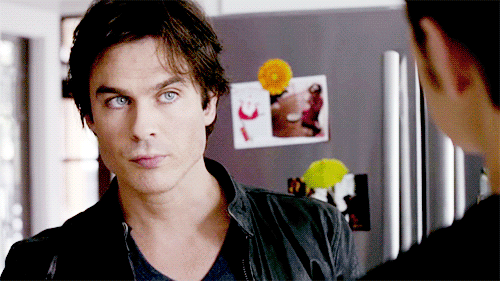
Oooohoohoo, you wish me to talk about my Night Raven College baes? Let’s see then...
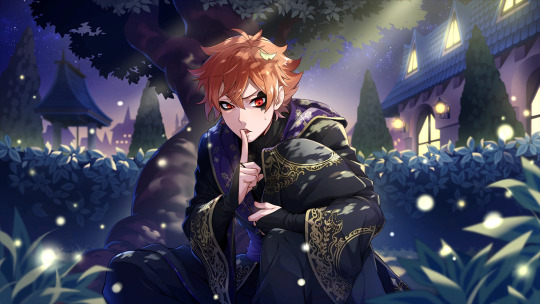
Ace Trappola ~ Okay, so I should admit right off the bat that I have a huge soft spot for the Heartslabyul dorm in particular. Alice’s Adventures in Wonderland and Through the Looking Glass by Lewis Carroll are one of my favorite things ever, and so most adaptations of those works tend to give me some amount of glee, even the really flawed ones. But for Ace specifically, it took me a little while to warm up to him, given that he can be a real prat, but once he and Deuce really rallied around Yuu (especially when they dropped everything on their winter break and took the bus all the way back to school during the Scarabia incident to try to rescue them and Grim -- MY HEART!!!), I fully adopted Ace as my second trash son and that was that. I also loved Ace’s development in the Ghost Bride story line, as well as his admittedly harsh, but still rather fair tear-down of Riddle immediately pre-Overblot. Ace can be really harsh sometimes, but that also makes him an incredibly honest sort who won’t take anyone else’s bull and won’t let anyone push him around -- yet at the same time, he’s also lighthearted enough that he never takes himself too seriously. In some ways he kind of reminds me of Jounouchi Katsuya from Yu-Gi-Oh!, and that’s definitely a compliment.
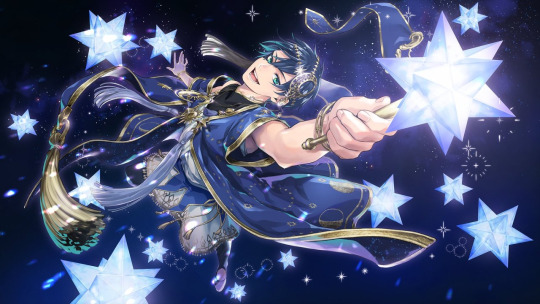
Deuce Spade ~ MY ORIGINAL TRASH SON. I loved Deuce pretty much from the get-go, considering how passionate he was about trying to fix the mistake with the chandelier and how adorable he was casting the only magic he could manage (“COME FORTH, CAULDRON!” XDD). Then there was the whole “chick” incident where we not only saw his delinquent side which he tries so desperately to hide on full display for the first time, but we also got to see how much he truly loves his mom and how friggin’ stupid and yet absolutely sincere he is, and I just fell in love with Deuce even more. The Wish Upon a Star event where we learn Deuce wants to basically be this world’s equivalent of a sheriff after having been such a delinquent in his younger years only made me feel all the more for this guy -- him wanting to be so much better than he was even if he’s not the smartest, strongest, or most talented guy around I find so compelling and likable.
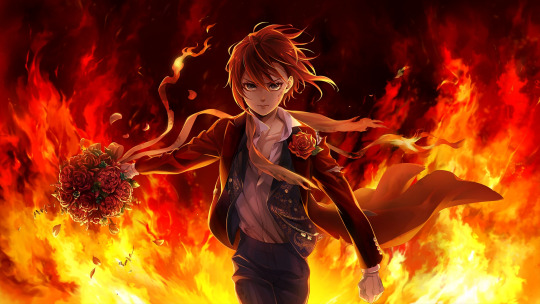
Riddle Rosehearts ~ Yeah, I know, a lot of Heartslabyul love, but like with Ace, it took me a LONG while to warm up to Riddle. I thought he was a total jerk and I wanted nothing more than to give him a good telling-off (“go ahead, use that stupid collar on me -- I don’t have magic for you to block, you bullying prat!”) until Ace got around to punching Riddle in the face and then tearing him a verbal new one for me. It honestly took Riddle’s Overblotting for me to feel the least bit sorry for him, but it was how sincerely he acted after the fact in trying to make up for his mistakes that really softened my heart to him. Riddle has lived his whole life following rules and convention to the letter, and it’s made him miserable, so now that he’s come to grips with the fact that he doesn’t need to be miserable in order to live an upstanding life, he’s softened a bit. Even with this, though, that rule-abiding, upstanding attitude isn’t always hard to shake, and I think it makes for a much more balanced outcome than if Riddle just went hog-wild and stopped caring about everything -- because the whole reason Riddle followed the rules so closely is he wanted to do what was best for all and to be the best he could be, too. His motivation for being so strict came from a deep passion for leadership and order, and I’m glad that passion of Riddle’s wasn’t dampened, but instead given nuance. Now he can focus his passion more effectively, rather than lashing out in all directions indiscriminately. Like Ace as well, I loved Riddle’s development in the Ghost Marriage plot line, particularly his individual side story with Malleus. It really showcased Riddle’s noblesse oblige moral code, which I personally find the most compelling and likable aspect of his personality.

Jack Howl ~ JACK IS A GOOD BOY. Anyone who disagrees can fight me. (LOL, not really, but...) Like with Deuce, I liked Jack pretty much immediately. From the start, he just came across as so much more down-to-earth and honest than either of the other two main characters from Savanaclaw (even if Jack is also a total tsundere, but honestly, if you’ve watched any kind of anime, you’re fluent enough in “tsundere” as a language to know exactly what Jack really thinks of something). He was sort of depicted as a black sheep in his own dorm, and -- honestly? -- I’m a sucker for characters that are sort of on the fringes and don’t quite conform to what people expect them to be. Add to that how passionate Jack is about working hard and being the best he can be in his own right, as well as how deathly loyal he is, and he’s just overall a character I would love being friends with.

Jamil Viper ~ Jamil was the first character who Overblots who I actually felt sympathy for long before we see his side of the story in flashback form. Part of this admittedly is because I could sort of see where Jamil and Kalim’s story was going ahead of time, but the other reason is that I could see how much work Jamil put in all the time. Even though yeah, it was a real dick move to try to foist out Kalim so he could become Head of Scarabia instead, and yes, he manipulated things to make everyone see Kalim as cruel and irrational, it doesn’t change the fact that Jamil still acted like a Dorm Head a lot more than Kalim did a lot of the time, in the sense of making sure things run smoothly. Kalim definitely brings amazing enthusiasm to Scarabia as its leader and inspires a lot of positive feelings in the people around him, but if there’s a problem, it’s Jamil who often ends up fixing it, not Kalim. And from the start, I really felt for this guy who Kalim -- simply due to privilege -- didn’t seem to acknowledge he was demanding so much of, without receiving the same kind of attention and appreciation in return. I never disliked Kalim for this, because I could tell Kalim didn’t mean it maliciously and admittedly Jamil really should’ve said something since Kalim adores Jamil and would have likely been more than receptive to hearing what he had to say...but at the same time, given their power imbalance, it’s also not completely unsurprising that Jamil didn’t feel like he could say something. The best part about Jamil for me, at least, ended up coming out after he was allowed to finally speak his mind. Yeah, maybe he’s a little meaner now. Yeah, maybe he’s not so patient or amiable now. But he’s also allowed to show more of that deep, searing passion and ambition he’s been bottling up for so long. I loved seeing how much he enjoys dancing and performing through the Fairy Gala event and the recent Pomefiore chapter. I’ve loved how thoroughly (and pretty justifiably) distrustful he is of Azul. I’ve loved how he’s sort of on the fence emotionally about looking after Kalim the way he used to and making sure Kalim doesn’t expect his service the way he subconsciously did before. Jamil is one of the TWST characters who surprised me the most in how much I enjoy him, and I honestly can’t wait to see how much more he grows.
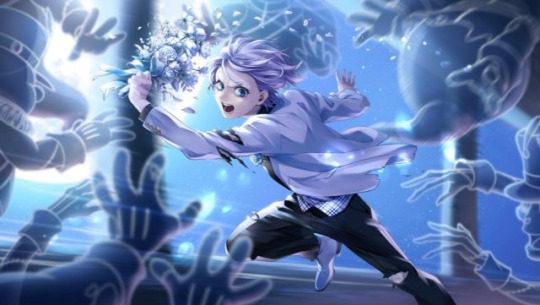
Epel Felmier ~ I WILL PROTECT THIS BOY, OKAY. Not because he’s delicate-looking, but because damn it, if he wants to eat macaroons and steak with the wrong fork, then he should be allowed to just go out and do it. I absolutely love the contrasts we’ve already seen in Epel so far. For as sweet and bishounen as his face is, he has a real rough, informal side fitting his background as a kid from the country, and yet he also has his “Prince Charming” moments too. He completely on his own comes up with the idea to arrive riding a horse when trying to impress the Bride during the Ghost Marriage event, and yet he’ll also tear into a bunch of ghosts who dare mistake him for a girl. Epel reminds me of a friend of mine from high school who also was a lot gruffer and more cynical than his short height and cute face would suggest, and it makes for a very interesting character, I think. You can’t pin this kid down or put him in a single box, and I think that’s awesome.
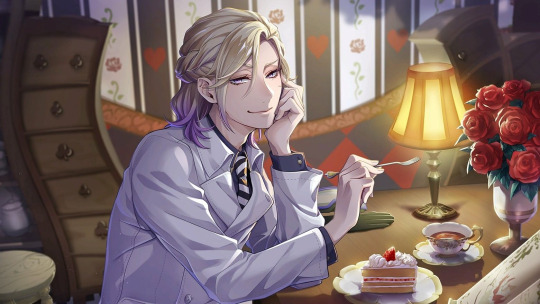
Vil Schoenheit ~ All right. Before the Pomefiore chapter, I thought there was no way in Hell that I would ever warm up to Vil. His slapping of people’s butts in the Fairy Gala event, his superficial focus on exterior beauty, and his bullying, condescending attitude toward Epel in particular really made me dislike him from the get-go. But then the Pomefiore chapter started and we reached the auditions...and I found myself agreeing with just about every critique he made, in contrast to Rook’s sunnier, fawning reviews. It made me feel like I was watching American Idol or America’s Got Talent and agreeing with Simon Cowell (which I honestly almost always did, whenever I watched those!). And as the Pomefiore chapter’s unfolded, I’ve seen that fascinating contrast in Vil. Yes, he’s very superficial -- but his dream is to act and be an idol, and in that world of celebrity, appearances are important. Yes, he’s very conceited -- but he’s also an incredibly hard worker who’s put in a lot of effort to improve himself and his talents to the point that he should be proud of them. Yes, he’s almost cruel in how relentlessly he pushes people -- but he never holds anyone to a standard he wouldn’t also expect of himself. Yes, he’s very forceful and sees his way as the only way -- but he does truly want those people to succeed in his own weird way, even if he can’t properly express it. Not to mention the fact that he’s constantly typecast as villainous characters, and he just wants to be a hero who makes it to the final curtain call!! My heart!! It’s made it so that like with Jamil, I’ve found sympathy for Vil long before he Overblots, and so I’m all the more eager to see how both the Overblot itself and its aftermath impacts Vil as a character and his relationships with the other characters.
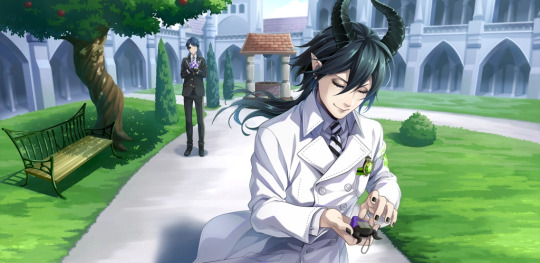
Malleus Draconia ~ Oh, come on, who doesn’t love Tsunotaro? This precious child needs all of the love and party invitations in the world! (And yes, he may be an immortal fae, but he’s still a precious child to me, so there.) I would totally love chatting about gargoyles and grotesques with him. X3

#ask me#opinion#twst#twisted wonderland#oh boy here i go#ace trappola#deuce spade#riddle rosehearts#jack howl#jamil viper#epel felmier#vil schoenheit#malleus draconia
42 notes
·
View notes
Text
TerraMythos' 2020 Reading Challenge - Book 32 of 26
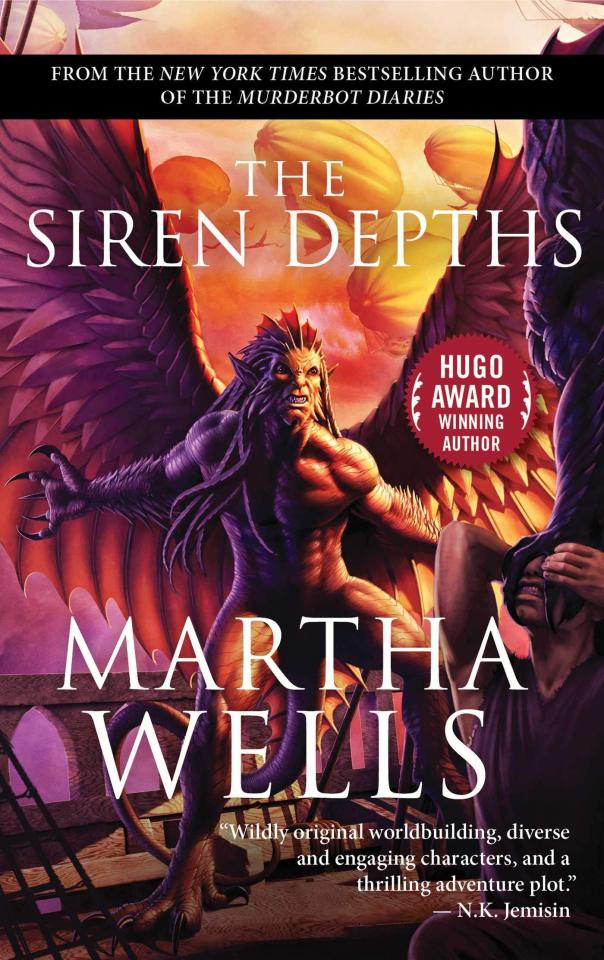
Title: The Siren Depths (2012) (The Books of the Raksura #3)
Author: Martha Wells
Genre/Tags: Fantasy, Adventure, LGBT Protagonist, Third-Person
Rating: 8/10
Date Began: 11/09/2020
Date Finished: 11/21/2020
Moon's past has always been obscure. A winged shapeshifter, he has spent most of his life as a solitary wanderer. He has few memories of his childhood, and only recently found others of his kind-- the Raksura. Now Moon has found a home as first consort to the queen Jade in the Raksuran court of Indigo Cloud.
However, when a neighboring queen recognizes his bloodline, Moon's new life is upended as he's forced to return to a family he doesn't even remember. Seemingly abandoned by Jade and overcome with doubt, Moon has to navigate the complex politics and grave secrets in the court of Opal Night alone. But an old enemy is about to return, threatening every Raksuran court in the Reaches.
The one thing he hadn’t expected to do was miss Indigo Cloud so much. He had been leaving people all his life, to the point where all the turns seemed like an uninterrupted progression of departures, and there had been people he had missed terribly. But this was a never-ending ache in his chest... You’ll get over it, he told himself. You always get over it.
But somehow, this time was different.
Some major spoilers and content warning(s) under the cut.
Content warnings for the book: As always, graphic violence and action. There is a disturbing scene that's... kind of forced cannibalism I guess (I'm not sure how else to describe it). Some sexual content is implied but not graphic. The r*pe plot point from The Cloud Roads is relevant, but is not depicted or described in detail. A romantic relationship with a significant age gap is briefly mentioned (both are consenting adults but it may make some readers uncomfortable).
For the most part, I enjoyed The Siren Depths more than the previous entries. I connected much more strongly to the central conflict, and was pleased to see some deeper character development than in the last two books. This entry also introduces fascinating new settings and characters while exploring some genuinely interesting ideas. It serves as a good parallel to The Cloud Roads, with similar plot beats explored in different ways. I did have one big problem which I will detail further in the review, but let's talk about the good parts first. Moon's conflict in this story, like the rest of the series, has to do with belonging. But The Siren Depths has the advantage of two books of development. From what we know of Moon's past, he sees any home as temporary, and when he's suddenly forced to leave Indigo Cloud (presumably for good), his new attachments and way of life come into question. To some degree, Moon sees this as an inevitable part of his life. Sooner or later, something out of his control will happen and he'll be abandoned. What I found relatable is there's several times Moon knows he is being irrational but still can't stop the negative downward spiral. Like... jeez, just call me out specifically next time! While a depressed protagonist can be a drag to read, I think it really works here because we've grown attached to Moon and know how far he's come. And sure enough, he does get his ass in gear when he realizes this ISN'T like before, and lots of people do care about him. The found vs biological family conflict is interesting as well. I think The Siren Depths does great here because you can see both points of view. Moon always assumed his biological family died, and they assumed the same thing about him. This should be a happy homecoming, but under the circumstances simply isn't. Moon resents being torn from Indigo Cloud because a group of people he barely remembers have a legal claim on him. Opal Night seems strangely hostile until you learn more about its politics and secrets. Even though they're early antagonists, they're not really villains; just a traumatized group of people who see Moon as a missing link from their past. When he's not what the others are expecting, obvious issues ensue, but Moon finds he does care about some of these people, even if it's not really his home. Outside of Moon, several other characters have arcs in this book. While the previous books feature a likeable enough cast, the characters are mostly one dimensional. Not so here; we explore the insecurities and struggles of some of the supporting cast. Jade isn't nearly as self-confident as she appears to be, and grapples with this throughout the book-- for example, wanting to prove to Moon that she is willing to do whatever it takes to get him back. Similarly, Chime's struggle with his involuntary transformation comes to a head here as his strange new powers become relevant again. We see just how bitter he is that he's cut off from his old magical gifts and still holds out hope that they'll return. We even get some indication that while this HAS happened before in Raksuran history, it's incredibly rare. There’s also an interesting hint on what the powers really are, which has some pretty big implications. This is potentially a future plot point, so I’m hoping it gets explored. (Also, I was totally right about Moon/Chime, do I get a prize?)
There are several new characters I found really interesting, namely Malachite and Shade. Malachite (spoiler: Moon's biological mother) is initially presented as the antagonist, and her behavior seems inscrutable. She's a powerful queen who commands respect, yet seems unpredictable and standoffish. All of this starts to make sense as one learns more about her. Turns out unbelievable, extended trauma really fucks with a person. The Fell destroyed her colony, killed her consort and most of her children, and she spent almost a year in full guerilla warfare against them. Yet she adopted the Fell/Raksura crossbreeds and raised them as her own children, demonstrating nothing but indulgent love and kindness towards them. I'm not sure I would be able to do that in her place. In general she's just a huge badass; totally decked out in scars and the first to leap into battle. At least we know where Moon gets it from. Did I say Fell/Raksura crossbreeds? Yup, that plot point is back. Only, it's explored in a different way here. The crossbreeds in The Cloud Roads are terrifying weapons deployed by the Fell. The ones in The Siren Depths, raised in a loving home, are just kind of weirdly pale Raksura. I liked Shade in particular, who we learn is Moon's half brother and serves as an interesting foil. Moon would probably be much more like Shade if the Fell attack on Opal Night never happened. Shade is an earnest and kind (if naïve) man and behaves like none of the Fell we’ve met in the series. I hope we see more of him (and Lithe, the other crossbreed) in future volumes, because I think they're an interesting take on nature vs nurture with the "inherently" evil Fell. Speaking of the Fell, while they themselves haven't changed much, I thought they were more effective villains than in The Cloud Roads. We see their manipulations and twisted views of the world in much more detail. There's a long sequence where much of the main cast is captured by The Fell, and their struggle to survive and potentially escape is harrowing. I also like that Moon isn't their main focus this time, which adds some nuance and perspective to their behavior. They’re also just... creepy as shit. While I do have some issues with the ending of the book, I think the Fell are handled pretty well beforehand.
I'd be remiss to ignore the always excellent worldbuilding in this series. Like in The Serpent Sea, we get to see more Raksuran courts, all of which feel distinct. It’s cool and impressive for a singular fantasy race to have multiple believable factions and societies. The settings in this book are also creative, including a giant half-dead mountain tree, a city carved into a giant statue, and what I can only describe as "Rapture, but make it a solarpunk prison". Wells goes into vivid, loving detail when it comes to the world. That being said, I would like to see more of the sea/sky realms, since this series has largely focused on the earth. The Three Worlds is kind of a misnomer if two of them don't really show up much. Oh well, maybe in future books/stories.
My main complaint, and what drags down the rating, is the ending. It's... underwhelming, confusing, and seems pretty rushed. I'll go into more detail below. *major spoilers for the ending* So... one of the big plot points in both The Cloud Roads and The Siren Depths is that the Fell are crossbreeding with captured Raksura. In The Cloud Roads, this is explained as a ploy to strengthen the Fell with some unique Raksuran abilities; queens can prevent others from shifting, mentors can scry future events, and so on. In The Siren Depths, however, we learn it's not that simple. There's some third party manipulating the Fell and encouraging their actions. The goal is to produce a crossbreed that physically resembles the (unnamed) Fell/Raksura common ancestor for... reasons. We are led to believe the being orchestrating this is in fact an ancient ancestor, though its motives are unknown.
While this feels like a retcon, the discrepancy is acknowledged in the story, and it is explained that the Fell in The Cloud Roads were either lying or those specific ones decided to pursue their own agenda. Which... fine, makes sense based on what we know about them. I'll let it slide. Perhaps it was hinted at earlier and I just don’t remember.
So Moon and the others follow the Fell to the mysterious source, a vast and abandoned underwater city. Soon they find the creature that's been imprisoned there. Turns out it's not the Fell/Raksura ancestor, but something different. I can only describe it as sort of eldritchy, with a vaguely creepy physical form, and the abilities to speak through dead/dying Fell and to create disturbingly realistic illusions. The Fell/Raksuran ancestors trapped it there eons ago, and the only way to free it is the physical presence of a member of the ancestor species (for some reason). Which explains why it has been encouraging the crossbreeding, since their common ancestor is presumably extinct. It's freed from its prison since Shade fits the "ancestor" criteria based on his physical appearance. Then, in the span of literally one chapter, it attacks everyone, chases the characters through the underwater city, gets hit by some water, then promptly melts like the Wicked Witch of the West and dies.
I had a couple problems with this ending. First, the whole Fell crossbreeding conflict with the Raksura is a huge generational trauma thing. Moon has his own horrible experience with them, of course, but it's also a big issue with both Indigo Cloud and Opal Night. Hell, it's the whole reason Moon was separated from his family and lived thirty-some years in exile without knowing what he was. The series literally wouldn't have happened without this conflict. To have everything explained away by "an eldritch wizard did it" is very anticlimactic. I vastly prefer the original explanation.
Second, we know basically nothing about this creature. How was it able to communicate with the Fell (and Chime)? Why was it imprisoned other than being super evil and stuff? Who knows. And yeah, it's possible this will be expanded on later. Except I'm pretty sure that when this book came out, it was the last one planned for the series. The next two books follow a different storyline and came out four years later. So this was probably the only explanation we were ever going to get.
I'm not totally against the concept, but it needed more time and a more interesting/memorable villain for it to work. Introducing all of this in the second to last chapter of (presumably) not only the book but the series, then defeating it with little effort, feels unsatisfying. Hell, there’s more time dedicated to discovering and exploring its prison than anything involving the creature itself! As it stands, the Fell were much creepier and more memorable bad guys in this book, yet narratively serve as bit players in the end. It just feels off.
Also, a nitpick, but the title of the book is weird. The Siren Depths is obviously referring to this imprisoned being. It's trapped underwater and is calling the Fell to it. But it's never referred to as a siren; I'm not sure that word is used at all in the book. It just seems like an odd choice of title that doesn't really fit the vernacular of the world. Siren has some very specific meanings/connotations in our world that don't translate to The Three Worlds. Not a huge deal, just something I noticed.
*ending spoilers end here*
Despite my issues with the ending, I really enjoyed everything else about the book. It does everything the other books do well while featuring serious improvements. I've heard mixed things about the next two books but plan to go in with an open mind.
5 notes
·
View notes
Note
2, 3, 7, 20 :3
(the ask meme in question!)
2. Tell us about what you’re most looking forward to writing – in your current project, or a future project
My next project is secret (>:3) but there’s one heck of a wham line near the end of it which I’ve been *heavy breathing* about for months. Also looking forward to the whole...structure of the thing. [/vague]
In slightly less vague pronouncements, I had a lot of fun writing Koichi & Jotaro in “seventh day” and I’m looking forward to writing more of that in the future!
3. What is that one scene that you’ve always wanted to write but can’t be arsed to write all of the set-up and context it would need? (consider this permission to write it and/or share it anyway)
God, so many of them, some of which I may wind up resentfully writing all the set-up for anyway, since that’s my M.O. (See: Buddhism fic was written in order to make one (1) joke, disjoint was written to make one (1) point about dissociation, etc.) A couple which I’m slightly less likely to write any time soon:
Less a scene and more a series of concepts related to Giorno (“Gold Experience is C-PTSD: The Stand,” I holler at the sky), which I will only wind up writing with a lot of kicking and screaming.
Nagoya AU: Jotaro nearly drowns in the three inches of water on top of Oasis 21. I would have to write an entire casefic to get to this point (it’s the climax), but maybe someday my desire to make that joke will override my common sense.
Also Nagoya AU: literal earworm Stand, controlled by a member of a mediocre Nagoya idol group. Do not ask me to explain myself.
7. What do you think are the characteristics of your personal writing style? Would others agree?
Let’s see:
so much focus on body language and tone of voice. so much
That Uncomfortable Feel
unreliable narrator! not in the “crazy and lying” way (ugh), but in the “trying to tell the story right but inevitably biased” way
I tend to utilize blank space a lot--either omissions from the narrative saying as much as what’s included OR that void that an emotion/sensation/reaction/person should occupy but very clearly doesn’t
what is a linear narrative
mentally ill people learning to navigate each other!!!!
very distinctive rhythm to the prose (to the point that I will write “[extra beat here]” when drafting if it doesn’t feel right)
People tend to characterize a lot of my fic as sad, which is...probably fair enough. I cannot attest to the sadness of my own fic, although I can say that I don’t write fic with the intention of making people cry. (Mostly I’m interested in depicting an experience, and you can feel how you want about it. Sad is apparently the predominant feeling for most people.) I’m also not sure that others read my prose quite as deadpan as it is in my head!
(A side note: I’m always fascinated by how people read their own writing! When I was little I went to a lot of author events and loved listening to folks read their own stuff, because there are little nuances and moments that hit differently. And then as a writer I’m always fascinated to hear people read my stuff, because the rhythm or delivery is always a little different than it is in my head. It makes me see the prose in a new light, which is cool!)
20. Tell us the meta about your writing that you really want to ramble to people about (symbolism you’ve included, character or relationship development that you love, hidden references, callbacks or clues for future scenes?)
Oh gosh, let’s see if there’s anything that you don’t already know about.
Here’s one that is so deeply in the weeds as to be nigh incomprehensible from Shrine AU:
Yukako is sitting on the floor, clutching a writing brush in one hand, and a wish-granting jewel in the other.
Kakyoin’s sacred object is a wish-granting jewel both because wish-granting jewels are associated with Inari and because wish-granting jewels are Buddhist iconography. This is relevant because Kakyoin’s lineage is mentioned in the fic:
He would not be able to recite from memory Kakyoin’s exact lineage of Inari subdivisions such that he wound up traveling from Fushimi Inari Taisha in Kyoto to Toyokawa Inari in Toyohashi to Kakyoin Temple in Morioh.
First of all, understanding this requires knowing that Inari can be subdivided, meaning that you basically break a piece off the original (sort of. sort of.) and then enshrine it elsewhere for a specific purpose. If the new Inari is successful, its specialty also becomes the specialty of the Original Inari on Fushimi Inari. This is why Fushimi Inari can offer success in fishing even though it’s located on a landlocked mountain.
Now, Toyokawa Inari is interesting because it’s one of the few remaining Buddhist Inari institutions (due to various historical factors, almost all major Inari institutions have wound up being/becoming Shinto). In case you’ve forgotten, the real life Kakyoin Temple was a Shugendo temple that was destroyed in the Meiji period. So Kakyoin’s whole path was: subdivided from Fushimi Inari (the Original Inari Source) to Toyokawa Inari (Buddhist institution) and then from Toyokawa Inari to Kakyoin (Shugendo instutition), then separated into its own shrine in the Meiji period (due to the forced separation of Shinto and Buddhism and the destruction of Shugendo sites), THEN merged with the Kishibe Shrine. Like a lot of forced separations, Buddhist elements weren’t entirely expunged, so his sacred object is still a wish-granting jewel, even though he hasn’t formally been associated with a non-Shinto institution for about 150 years. So Kakyoin has had a pretty wild and miscellaneous religious path--as befitting of the god of so on and so forth! Whereas Rohan’s been in the same place the whole time, which is part of why he’s so scornful of Kakyoin (“third-rate Inari splinter with no coherent theme,” etc.).
“Wow, Queenie, why is this so unnecessarily specific?” Every part of Shrine AU is unnecessarily specific; I don’t know what to tell you.
#ask Queenie#Queenie actually says something on this blog#parallelism palooza: the journey#talking about any line of Shine AU is like *smacks 600-page dissertation on the table* okay let's go
1 note
·
View note
Text
BBC’s The War Of The Worlds blog - Episode 2
(SPOILER WARNING: The following is an in-depth critical analysis. If you haven’t seen this episode yet, you may want to before reading this review)
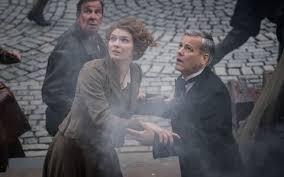
Never before have I witnessed something this god awful. I’m actually gobsmacked. I knew Peter Harness was a terrible writer, but I didn’t think even he could fuck up this badly. I was utterly dumbfounded by the end of the second episode. I couldn’t believe what I just watched. Not only does this fail as an adaptation of War Of The Worlds, it fails as a story in and of itself.
The problems with Episode 2 surface almost immediately within the first few minutes. A flash forward to a post apocalyptic Earth where we see Amy taking care of her son as humanity struggles to survive because of the red weed (which doesn’t look terribly convincing sadly, but that’s the least of this series’ problems). From there the episode continuously switches back and forth to the invasion and the aftermath throughout, which completely ruins the pacing, but it’s actually even worse than that. These flash forwards also giveaway the ending of the story. That the Martians end up losing. Harness tries to act all clever-clever with it by having British propaganda claim that the army defeated them, but the damage has already done. Thanks to this reveal, Harness has successfully managed to completely suck all tension from the story completely. The Martians no longer pose a threat because we, the audience, know they eventually lose, and we know that Amy at least survives, so at no point do we ever worry about her safety. I was absolutely flabbergasted when I saw this. I couldn’t believe any writer could be this stupid as to sabotage their own story by completely defanging their villains. As for the red weed slowly killing the planet, not only do I feel this unnecessarily complicates a perfectly simple narrative, it also opens the door for humanity to overcome their Martian oppressors when the whole point of the original story was that we only survived by the skin of our teeth. Our human ingenuity had nothing to do with it. We’ll have to wait and see what Episode 3 brings, but I’m not optimistic.
Meanwhile the invasion itself is still just as stilted and lacking in focus as it was before. Certain scenes stand out, like the black smoke enveloping London and the Tripods attacking the ferries, but because we know the Martians ultimately lose and that Amy survives, there’s absolutely zero suspense. (And yes, I know War Of The Worlds is a hundred year old story and everyone knows how it ends, but that doesn’t mean you can’t build tension). Also because of Harness wilfully reducing the Martians to incompetent fools, he has to resort to cheap shock tactics in the desperate hopes of scaring the audience, like when we see one of the Tripods kill a baby. Or how about the bit where Amy almost gets raped in the post invasion scenes? After all that performative feminist posturing last week, it’s quite galling to see such a sexist trope be used here for a cheap bit of drama. It’s fucking pathetic.
And once again the focus is in all the wrong areas. Instead of depicting the horrifying events of the Martian invasion, Harness is more preoccupied with Amy and Rupert Graves’ character (I’m sure he has a name, but I can’t be bothered to remember it at this point) squabbling every five minutes. Guys! Humanity is being destroyed by fucking aliens! Can this not wait?!
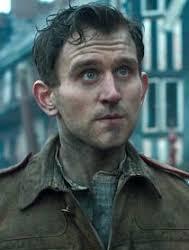
I’m assuming the whole baby killing thing was an attempt to show us the selfish nature of man or something, but George and the Artilleryman barely make the effort to actually look for the baby and the scene doesn’t go on nearly long enough to get us invested in the search and their eventual failure. The baby is practically thrown away just so Harness can have a moment where social media will go ‘OMG, they killed a baby in War Of The Worlds! How edgy!’ And the annoying thing is the book does actually have morally grey and shocking moments that Harness could have adapted if he wasn’t too busy trying to second-guess the audience and show what a dark and edgy writer he is. There are two important characters in the source material that the narrator encounters who offer different points of view on the events of the novel. There’s the priest who we see slowly lose faith in God and become more and more panicked and erratic, and there’s the Artilleryman, who represents British colonial attitudes, believing that humanity will ultimately triumph when the evidence clearly doesn’t support this. Here the Artilleryman is played by Dudley Dursley himself Harry Melling, who does a decent job with the material he has been given, but unfortunately the character he’s being forced to play is just utterly inadequate.
Continuing with his trend of writing allegories to things that have nothing to do with War Of The Worlds, Peter Harness takes the opportunity to comment on military conscription, even though conscription wasn’t introduced to the UK until 1916. So now the Artilleryman isn’t some impressionable nationalist that has willingly bought into imperial dogma, but rather he’s a scared little bunny rabbit forced to fight a war against an enemy beyond his comprehension. Worse still, George gets conscripted into the military for literally no fucking reason. He doesn’t get given a gun or anything and despite the fact that he knows more about the Martians than the soldiers do, none of them fucking listen to him when he tries to explain the heat pulse thing or why it might not be a good idea to shout at a Tripod. Then, when they think they won the battle, the captain points his gun at George and forces him to wade into the marshes and investigate. Again I must stress that George doesn’t have a gun! It’s just utterly contrived!
Oh but don’t worry. Harness finally addresses what the source material is actually about. British imperialism and colonialism. Unfortunately he does it with the subtlety and nuance of a giant steamroller driven by Marilyn Manson. Now admittedly the book isn’t very subtle about it either as the narrator comes right out with the comparisons between the British and the Martians, but the thing is the book gets away with it because it’s told from the perspective of a journalist writing about his own experiences after the fact. H.G. Wells has the licence to draw direct parallels because the narrative form he has chosen allows him to. A TV series however - a visual medium - cannot get away with this. Harness, not having the faintest idea how to address the themes of the source material organically in the visuals or the plot, resorts to sledgehammer tactics to get the point across. In the flash forwards to post apocalyptic Britain, we see Amy’s son reading a book that details how the British defeated the Martians as part of some propaganda initiative. A speech is made about how powerful and unstoppable the British Empire is, whilst intercut with soldiers having their arses handed to them by the Tripods. We see several characters maintain a stereotypical ‘stiff upper lip’ attitude as though the Martian invasion was a minor inconvenience instead of a shocking tragedy. There’s even a moment where the Minister of War is babbling on about how much more powerful the Empire can become if they can use Martian technology before succumbing to the Martian’s black smoke and we see literal bile foam from his mouth. It’s all so painfully on the nose and doesn’t offer any intelligent points or topics for discussion other than ‘empires are bad.’
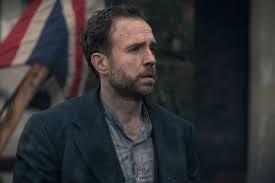
And that’s not to mention all the other contrivances and annoyances in this episode. Despite Eleanor Tomlinson giving it her all, I still couldn’t give two shits about her character. Rafe Spall’s performance as George is still utterly atrocious, running around with a gormless expression on his face as though he’s just lost his wallet. Rupert Graves is utterly wasted as George’s brother and has no good material to work with. We also have a little girl join the group in a desperate bid to draw some sort of emotional reaction from the audience (it doesn’t work) and we have a sick older woman who serves no purpose whatsoever as far as I can see. In fact she really pissed me off due to the way in which she gets poisoned. It’s clearly meant to be there to establish the Martians terraforming Earth, but good God it’s stupid. How does she get poisoned? By drinking a random cup of water someone had just happened to leave lying around in the middle of a field.
I... I... Harness.... Harness, does your brain work?! How the flying fuck did you ever manage to get a career as a writer?!?!
BBC, I beg of you, please stop using our TV licence fees to fund hack screenwriters’ poorly thought out and unentertaining fanfiction!
PLEASE!
12 notes
·
View notes
Text
The Boys - Good & Bad
Being an itemized list of the strengths and weaknesses of the first season Amazon’s superhero show The Boys, based on the comic run of the same name by Garth Ennis, which I haven’t read.
GOOD:
The show looks good. It’s not tremendously visually inventive on the level of, say, Legion or Doom Patrol, but it’s got a definite style, and not just in the action scenes. The stagings pop, the street scenes look crisp and interesting, the boardroom scenes take advantage of the set designers’ inventiveness. There’s the requisite loss of saturation once our two main characters lose their respective love interests, but it’s not color-graded out of existence, the way a lot of other shows trying to evoke masculine despondency do. A “gritty”, laddish superhero show conjures up certain expectations where visuals are concerned, and The Boys exceeds them at almost every turn.
There are actual episodes! With beginnings and endings and common themes! I had no idea streaming shows could still do that, but The Boys is really good at finding mini-stories within its overarching plot and structuring its episodes around them (which should be a basic implement in a TV writer’s toolkit and instead has all-but disappeared). Episode 2 is about the Boys realizing how screwed they are by having captured a nearly-unkillable superhero who has seen their faces, and trying to figure out a way to kill him. Episode 5 is structured around Annie and Hughie’s visit to a superhero-themed Christian revivalist festival. It gives the entire season a more engaging structure, and pulls you along with the story in a way that most streaming shows don’t even attempt.
There are some genuinely clever worldbuilding choices that emerge from the “what if superheroes, but awful” premise. The fact that superheroes star in their own movies, for example, or that their power competitions become major sporting events, is hilarious, and perfectly conveys the sense of moral bankruptcy that I think the show is going for. And the crossover the show posits between superhero worship and white Evangelicalism is an obvious and perfect fit, tying into the latter’s barely-concealed love of power and authoritarianism. Also, there are some inventive demonstrations of how combining superpowers, limited intelligence, and corporate greed can lead to horrifying results, some funny - The Deep trying to rescue a dolphin from captivity - and some genuinely gutting - the plane crash scene in episode 4 is the queasy highlight of the season, as the viewer realizes just a few seconds before the characters do just how badly they’ve screwed up, and how horrible their future choices are going to have to be.
The cast is uniformly excellent, and pretty much everyone gets a lot of different layers to play. The highlights are Elisabeth Shue, Erin Moriarty, Jessie T. Usher, and Tomer Capon (bit of hometown pride here, but it’s easy to see why he’s such a well-regarded young actor in Israel), but pretty much everyone is good and interesting to watch. Even Karl Urban, who gets the show’s most thankless task - he has to carry most of the story while playing its least nuanced character - manages to infuse some humor and complexity into Billy.
There are a lot of interesting, complex relationships, the top one being Homelander and Madeline Stillwell. As a character says near the end of the season, it’s a relationship that is “hard to quantify” - does he want to fuck her, or kill her, or be her child? Does she want to control him or does she genuinely get off on his desire for her? Other relationships are less fraught - Frenchie and Kimiko are incredibly sweet together - but still a lot of fun to watch.
The show seems to understand that at the root of almost every villain, and certainly privileged ones, is childishness. You see this in the way The Deep sinks into self-pity after experiencing the consequences of his sexual assault on Annie, or the way A-Train becomes obsessed with blaming Hughie for his girlfriend’s death, even though he’s the one who killed her. You see it most of all in Homelander’s resentment of Madeline’s baby and the attention she lavishes on it. It’s simply stunning how openly envious this grown man is of a months-old infant, and it makes every scene the two share almost unbearably tense, because you’re just waiting for Homelander to snap and kill the baby. Which ends up much more effectively conveying the point the show is trying to make than the sudden shock of him actually doing it would have - the fact that this character would clearly feel themselves justified in killing an infant, and is only holding back because he knows there’ll be a fuss, is the sum total of the show’s criticism of absolute power.
(This emphasis also justifies the show’s insistence that Hughie is redeemable, because though he starts out quite immature, he does grow, unlike the superpowered villains. He starts the season killing a super who hasn’t really done anything to him, just for the rush of it, and ends it saving the life of the super whose selfishness destroyed his world, because he’s actually realized that his are not the only problems that matter.)
Someone seems to have realized that having a female (Asian) character whose name is simply The Female is an absolutely terrible idea, and the show gives her a name as soon as possible. There’s also hints that she may be regaining the power of speech.
BAD:
The use of violence - and particularly sexual violence - against women ends up privileging men, even when those men are the perpetrators. Both Hughie and Billy are motivated by the loss of the women they loved, and in both cases the show plumps for the classic approach of single scene featuring the love interest being angelic, and doesn’t bother to shade either of them in or give them a personality or a chance to speak on their own behalf. And even when the victim is a main character, as when The Deep assaults Annie, the focus is much more on him than on her. Annie processes her trauma in a scene and a half, and it ends up being folded into her overall dilemma over how to be a superhero. Whereas the Deep spends the rest of the season coping with the consequences of his actions and folding them into his general lack of self-esteem. While there’s the germ of an important point there - just because this guy has problems of his own doesn’t justify his assault on another person or make him particularly tragic or compelling - the show’s insistence on going back to that well, even as the season approaches its climax, is simply baffling.
This feels, in fact, like a smaller component of the show’s broader problem with sexual ethics, the fact that it seems to have no way of distinguishing between sexual behavior is depraved, and sexual behavior that is just weird or maybe a bit kinky. Like, the fact that the Deep has consensual sex with dolphins is not worse than, or even equivalent to, the fact that he assaulted Annie. The fact that Homelander prematurely ejaculates when he and Madeline have sex isn’t a worse reflection on his character than the fact that he may have raped Billy’s wife. And yet those cases are treated as equivalent by the narrative. It ends up feeling profoundly anti-sex, rather than anti-sexual-violence, an impression that is only intensified when Annie and Hughie - the show’s sole “good”, loving couple - have sex that is completely vanilla (and despite Hughie’s earlier assurances that he isn’t intimidated by Annie’s strength, he still ends up being the dominant one in bed, and she even lets him be on top). It also prevents the show from any serious discussion of the one aspect of sexuality that is unique to its setting, the possibility of supers inadvertently hurting their human partners. The scene in which Popclaw crushes a man’s head between her thighs is the nadir of the season precisely because it’s played for laughs, for that “aren’t we outrageous” vibe that everyone told me the comic was suffused with. When actually you could do something interesting and character-based with it, if the show actually cared to.
(Having said all this, I do think that the show is a lot better on the subject of sexual violence than it could have been, and a lot better than the source material might have dictated. It feels significant that - with the exception of the aforementioned Popclaw scene - we never see any act of sexual assault on screen. We see Homelander and the Deep scoping out their victims, Rebecca Butcher and Annie, and maneuvering them into a position of vulnerability. And we see the aftermath of the assault for both victims. But we don’t see the act itself, in a series that is otherwise perfectly happy to depict consensual sex, even if it judges anything resembling kink. I also thought the handling of Queen Maeve, as a woman who has lived for years under a sustained campaign of sexual harassment, was extremely powerful - again, the focus is on how the abuse twists the victim up and makes them feel powerless and alone, not on any overt act of violence.)
I really don’t get why I’m meant to care about Billy Butcher. It’s not even that I don’t like him - I just find him completely uninteresting. He works as an engine of plot and a way to inject chaos into the other characters’ lives (the repeated device in which he authoritatively promises to solve the team’s problems, only for the show to cut away to him alone, wearing an expression that makes it clear that he has no idea what to do and is about to make everything worse, is pretty funny and effective). But as a character in his own right and with his own story, he just feels too one-note and monomaniacal for me to care about. I care what happens to MM and Frenchie and Kimiku and Annie and Maeve. I even care a little what happens to Hughie. I simply can’t bring myself to give a fuck about Billy.
I don’t see why I should be rooting for Hughie and Annie to make it work. It’s great that he feels she helped him rediscover his moral compass, but in the meantime he lied to her, used her, and concealed the fact that he had murdered one of her teammates from her. Annie has the right of it when she hears his confession and replies “the thing is, I don’t care”. It would be one thing if their reconciliation at the end of the season was more of an ethical one, a case of Annie choosing to rescue Hughie and the Boys because she knows they don’t deserve to die, not because she forgives him. But I got the impression that we were meant to read it as a romantic reconciliation too, which Hughie hasn’t even come close to earning.
If you must have interchangeable Middle Eastern terrorists as your go-to, killable background villains, doesn’t it seem obvious that there should be at least a few positive, named Middle Eastern characters in the foreground? (I suppose Frenchie might count? But given Capon’s heritage, he could just as easily be a Sepharadic Jew, which doesn’t really avoid the problem of Islamophobia that the show cheerfully blunders into.)
The plot kind of loses the thread towards the end of the season, partly, I suspect, because of the need to set up characters and plot points for season 2. It’s a particular shame because the plotting had been so strong in the first half of the season.
The sound mix is terrible. It should tell you something that I even noticed this and worked out the right term to use for it, because I’m usually completely illiterate on these matters. But after the millionth time you’ve had to raise the volume during a dialogue scene, then immediately lower it during an action scene, you start to wonder if there isn’t something wrong.
Overall, this is a much smarter, more interesting, and more entertaining show than discussions of the comic had led me to expect, but I can’t help but wonder if it isn’t benefitting from the fact that we’re so saturated with superhero stories right now. There’s less pressure to be the one subversive superhero story, which leaves The Boys room to be more character-focused, and to use superheroes as more of a metaphor for the corrupting influence of power and the evil of corporate overreach. Its supers feel a lot more like generic celebrities - A-Train is an anxiety-ridden athlete; Annie is a pageant kid; Maeve is an aging movie star whose career and soul have been blighted by ubiquitous sexual harassment. Characters who are genuinely set apart by their superpowers, like Homelander, are in the minority (and even in Homelander’s case it turns out his psychopathy has more to do with having been raised in a lab).
Basically it feels like the people who adapted the comic saved it by telling a story that is much more generic than the original, which may be entirely to the good. But I do wonder whether the second season won’t veer further into exactly those parts of the show that I find least interesting. The final scene seems to suggest much more of an emphasis on Billy’s manpain and his conflict with Homelander, and the introduction of superpowered terrorists threatens to move the show away from the criticism of power that made the first season work.
#the boys#this was a lot better than i was expecting#while still having enough flaws#that i can easily see it falling apart in season 2#still#if you were holding off because of the comic's reputation#the show is a lot smarter and more nuanced
47 notes
·
View notes
Photo

“Chalk One Up” | Directed by Seith Mann, Cinematography by David Klein
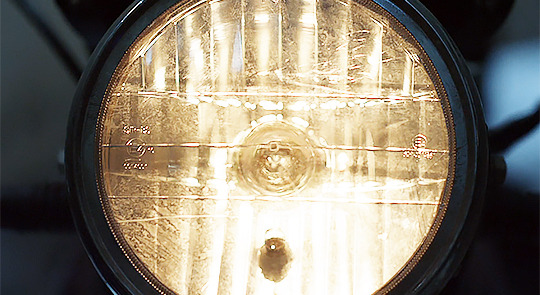
The episode opens with Carrie arriving from a long night out doing… God knows what with God knows who. We love the starkness of this close-up on the exterminated motorcycle light. According to Lesli Linka Glatter, this mode of transport is based on a real life story:
“The scene where she gets out of the embassy was based on the real agent who Carrie is based on. She was based in Iraq at the time and that’s how she got out: by dressing as a man and traveling on a motorcycle. So, we used that for this. Also, you can’t leave in Kabul without an armored vehicle.”
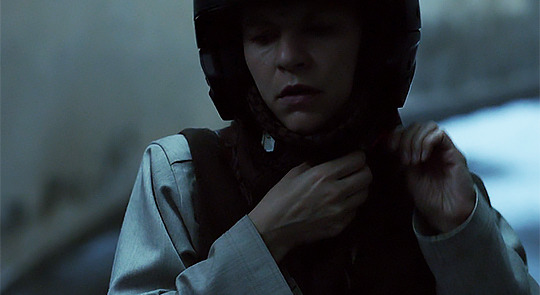
...as the camera slowly pans up to reveal it’s Carrie underneath that (gigantor) motorcycle helmet, the question becomes clear: where the fuck was she?
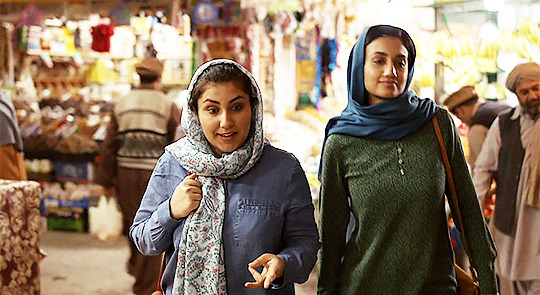
Sara loved these scenes between Samira and her friend. Homeland has depicted several cities in the Middle East over the years but has rarely given us glimpses into the world outside the walls of a hotel or CIA station, especially without our main characters. The market that Samira and her friend walk through is vibrant and filled with color, as are their outfits. It’s a stark contrast to the interiors of the CIA station. And Samira’s line that the Taliban didn’t go away but were no longer hiding proves remarkably predictive of the rest of the episode’s events.
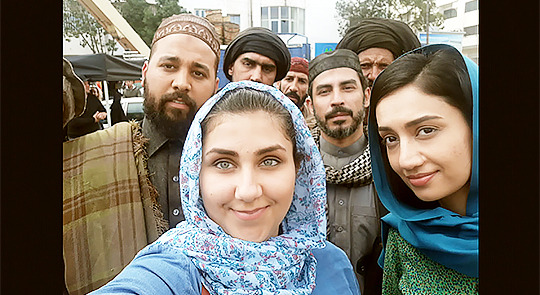
The real highlight of the scene is the selfie, of course. We love the detail of the man on the far, far left being cut out. Samira’s friend is the master of the one-arm selfie!
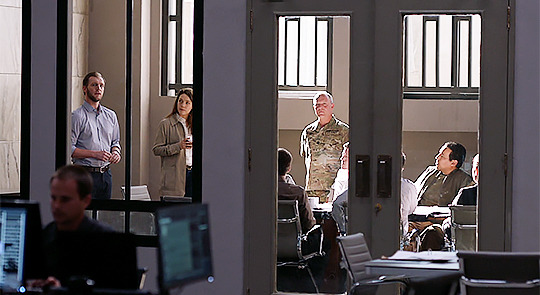
This shot of the various players at the Kabul station looking outward at Carrie is striking. It’s almost a reverse fish bowl. Carrie remains on the outside but everyone’s looks are in her direction. Jenna standing at the front of the room further suggests she was never “stuck in the starting gate.” She’s in the same position of power in that room as the Chief of Station and the commanding military officer at right. From afar, the dynamics are almost similar to early season one, Carrie running an ops meeting with Saul by her side. All of which is to say… is Jenna the Carrie to Mike’s Saul?
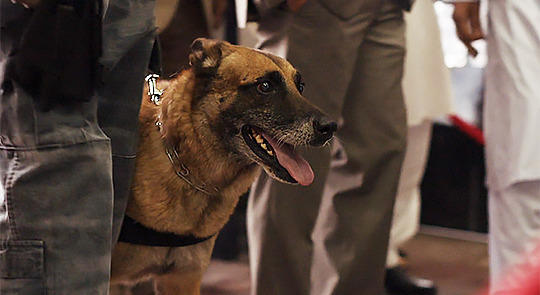
Dog.
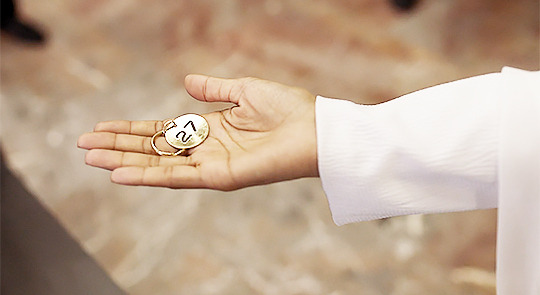
This was such a specific detail that we thought it required pointing out, but 27 is not a significant number on this show (at least that we can remember), so we’re not sure why they bothered to show this.
...unless it’s a reference to the general ominousness of the 27 Club and a hint that Carrie (who, to be fair, is far past the age of 27) is going to die.
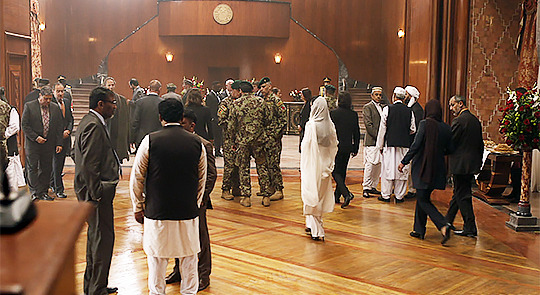
This week the show confirmed that Tasneem is the Director of the ISI. Which means that (after President Elizabeth Keane) she’s the second most powerful woman ever depicted on this show. And boy does she dress the part!
Tasneem’s all-white ensemble is attention-grabbing and distinctive (the other women in this frame are dressed in dark clothes). It’s also visually similar--especially with her long, black hair peeking through the sheer fabric of her headscarf--to the dress worn by several other men at the reception.
Homeland has told lots of stories over the years--whether intentional or otherwise--about the challenges women face living in a patriarchal, misogynist society. Whether it’s Martha losing her career because her loser husband couldn’t stand having a wife who was more powerful and smarter than he…. Or Allison dying in the back of a car near the Russian border in an act of scorned lover revenge. Or Carrie, screaming and crying at the end of “The Vest”... but being right the whole time.
Or, as Abigail Nussbaum said more elegantly than we ever could:
“Carrie is, in many ways, a boogeyman; she is what professional women, and particularly ones in male-dominated professions, have been taught never to become - emotional, hysterical, crazy. Emotion is how women who want to be taken seriously are undermined and dismissed. Even if you’re perfectly sane, being emotional - and most especially, being angry - devalues you and your professional contribution. A woman can be called crazy simply for behaving like a normal human being rather than a robot (and of course, if she behaves robotically and unemotionally, she’s a cold bitch). But Carrie isn’t simply emotional (though she is that too, and worst of all, she allows her feelings for a man to cloud her judgment) - she actually is crazy and hysterical, in the proper clinical sense rather than the exaggerated one which attaches to any feminine display of emotion, and profoundly pathetic and unattractive in that state. And she’s completely right, the only person who figures out Brody and Abu Nazir’s plans and motivations, and the person who saves the day by being hysterical, infecting Brody’s daughter with enough of that hysteria that she calls her father and convinces him not to blow himself up.
It’s certainly possible to read this arc as purely tragic, Carrie’s self-destruction being the cost of saving the world (though this is a character arc that is applied to men as often as women, for example in Thomas Harris’s Red Dragon), but to my mind its effect is more complex. It makes a crazy, hysterical woman into a hero without in any way mitigating her craziness or hysteria, and thus defangs the argument that emotion in women is a weakness. It’s the rational, sane men around Carrie, who turn away from her unattractive mania with distaste and embarrassment, who are blind and incompetent, and it’s that same inability to look past surfaces that leads them to put their trust, wrongfully, in Brody - just as Carrie performs hysterical femininity, Brody performs stalwart masculinity. Both are misleading.”
All of which is to say, we’re really fucking pumped to see how Tasneem’s role expands for the rest of the season, and we think the array of women in Tasneem, Carrie, and Jenna and their varying degrees of power is going to be really interesting to see unfold.
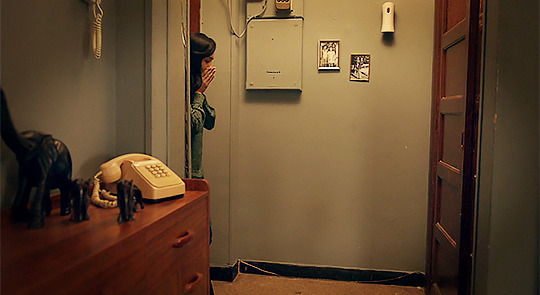
Sara is obsessed with this shot. She’s obsessed with the set design of Samira’s apartment. She’s obsessed with this moody lighting. She’s basically just obsessed.
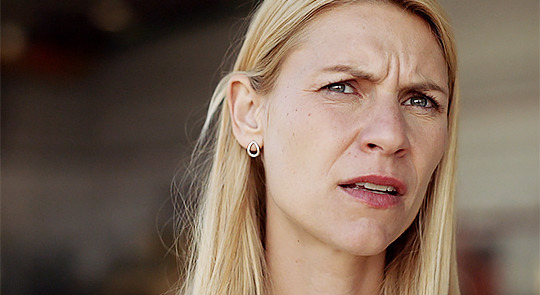
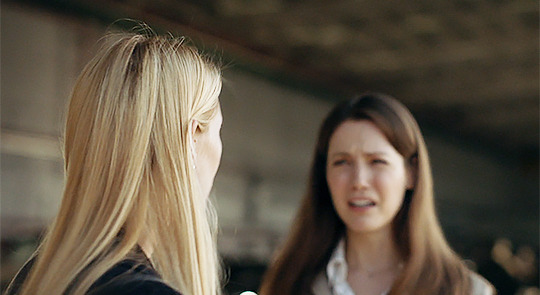
Last week we had a slow pan around Jalal to reveal Tasneem. This week we have a similar slow pan around Carrie to reveal Jenna. This definitely means that Sara’s theory that Jenna will “single white female” Carrie is right on track.
Also, Gail hereby declares Carrie’s delicate silver jewelry her “FULL circle earrings,” because everything is coming full circle this episode, including accessories.

That said, we can’t deny the power of this shot. First, we have to note what’s going on in the background (which is actually in focus). President Beau has just arrived off Air Force One and immediately stops for a photo op with the Afghan president. From the beginning, the show is clear this is an optics-based trip.
But we really love this image of Carrie and Jenna (out of focus, but in the foreground) side by side. Again, they mirror each other, but in opposite ways (“So they’re mirror opposites?” --Sara’s brain). Carrie’s light hair versus Jenna’s dark hair. Jenna’s light jacket versus Carrie’s dark one. It’s eerie.
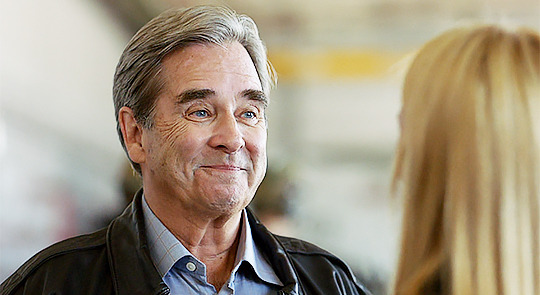
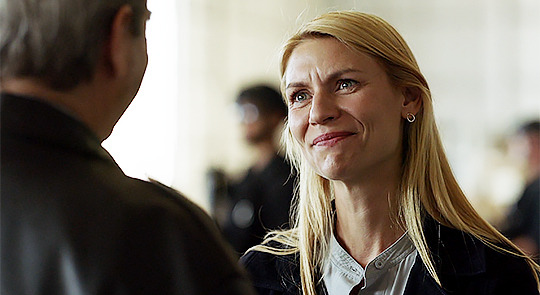
On the podcast we talked at length about the scene between Beau and Carrie. It’s genuinely moving. The staging of it is unique as well. The camera shoots them both at the same height. They stand close together. Ironically, the power dynamic seems almost equal. He’s one of the few people who’s ever acknowledged the sacrifices she’s made in service of her country.
Their twin smiles here are all the more tragic following the sequence of events that closes the episode. They all sincerely want peace. So many characters smile real, genuine smiles this week. That’s not a normal Homeland occurrence!
And they all legitimately believe in what they’re doing. They believe they’re doing the right thing. Maybe they are. But partly out of necessity, and partly out of more selfish desires (Hayes later says it’s all about getting a second term), they get caught up in the theater of it all. They make poor decisions. They take the wrong risks.
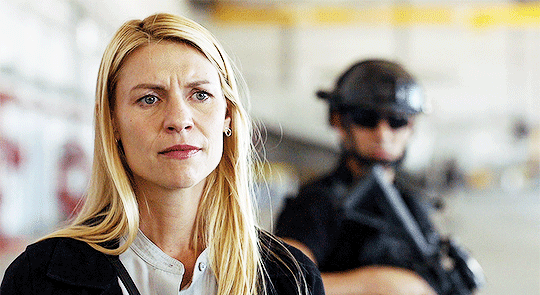
Every so often in this series we have to abandon screenshots in favor of gifs in order to truly capture ~the moment~ and this is one of those times! The way Claire plays Carrie’s reaction here is so specific, so nuanced and strange and wonderful. These “lived in” moments are something we’ll really miss when the show is over.
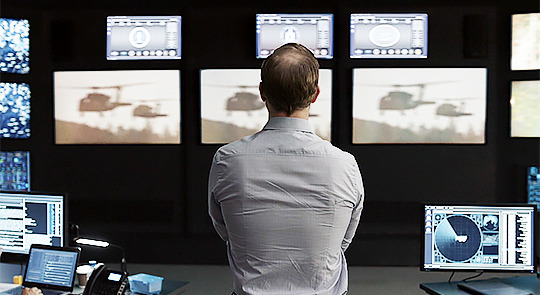
IJLTP.
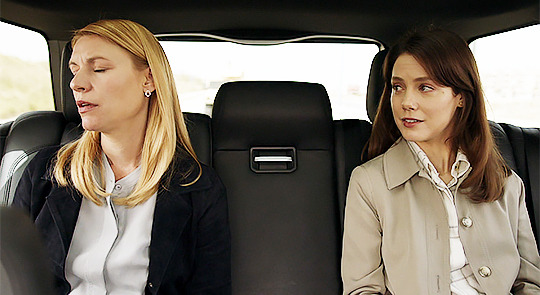
We’ve all been there, Carrie.
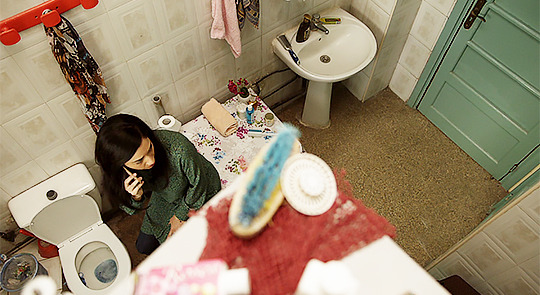
This is another interesting shot choice. We’re not sure what its purpose is, other than to add interest to a fairly run-of-the-mill scene. But still, the set design! *heart eyes*
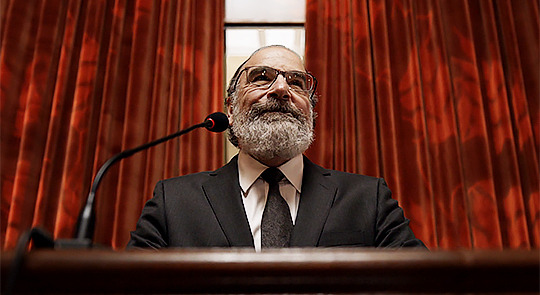
Sara’s note for this shot was “Saul is so extra.” We talked about genuine and sincere smiles above and Saul’s here does qualify… sort of. This is halfway between genuine and self-aggrandizing. AKA “where Saul lives 100% of the time.” He looks like a director about to screen his short film at Sundance. The red curtains parting slowly behind him are Too Much.
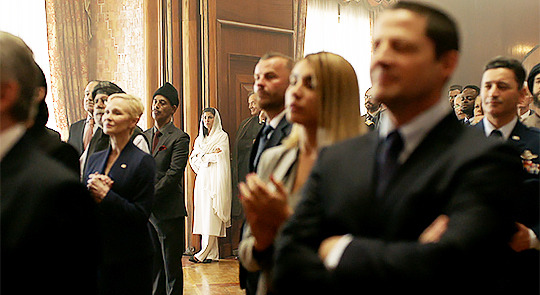
Tasneem and G’ulom are the kids in the back of the classroom who are so fucking done with this shit but can’t leave because they’ll get detention. We will continue to stan.
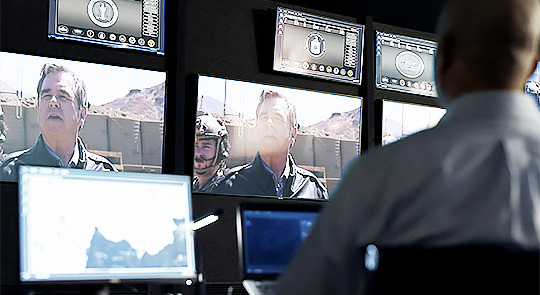
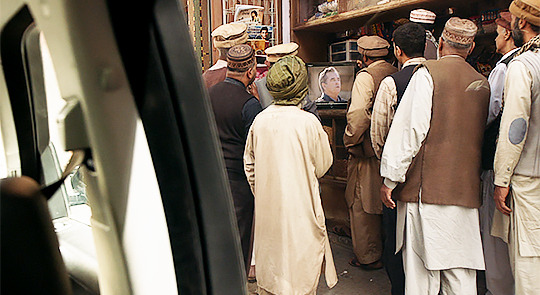
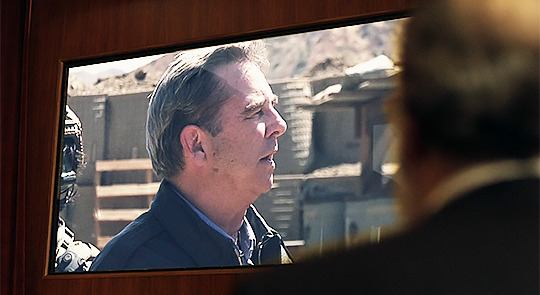
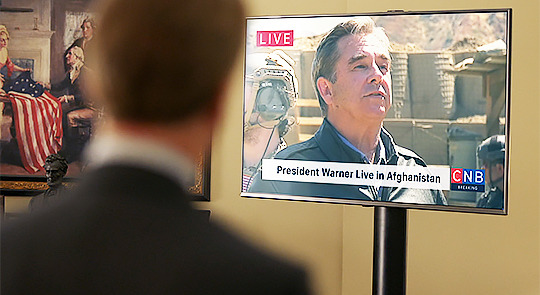
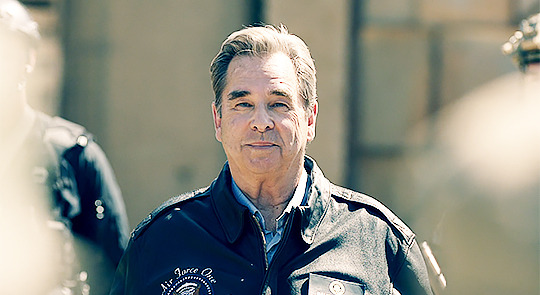
It’s a classic Homeland device to show a significant moment from a variety of perspectives, especially if those perspectives involve screens. The multitude of angles on Beau’s speech here reminded us a lot of Keane’s resignation speech in the Oval Office in “Paean to the People.” Coincidentally, that was her last hurrah as president too.
(P.S. Another Saul over-the-shoulder shot!)
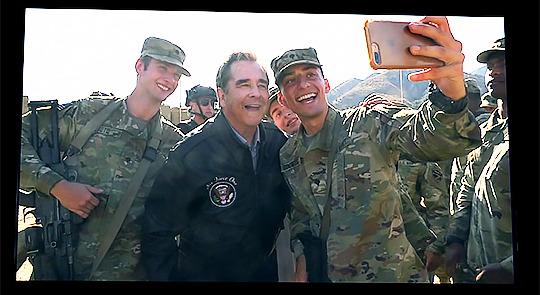
Two selfies in one episode!
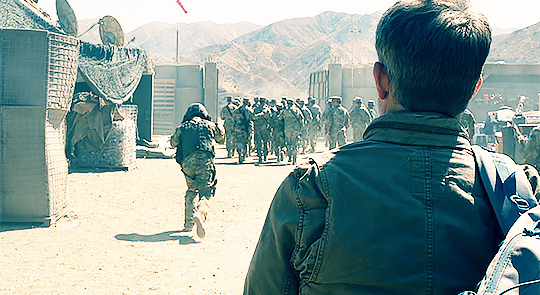
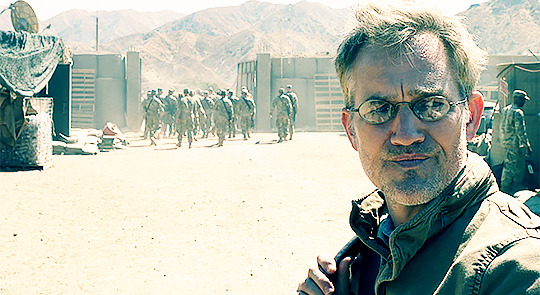
We loved the payoff to Max’s subplot. For once this season the weird LA filter actually looks nice! These are beautiful shots and the reflection in Max’s glasses is especially striking.
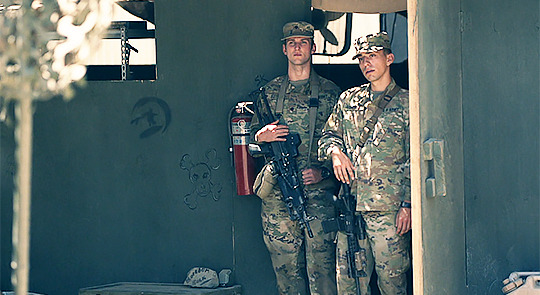
The skull and crossbones on the barracks is an ominious detail. As is the rock labeled “Boredom Rock.” Death and boredom really have been the two extremes of Max’s stint at the combat outpost.

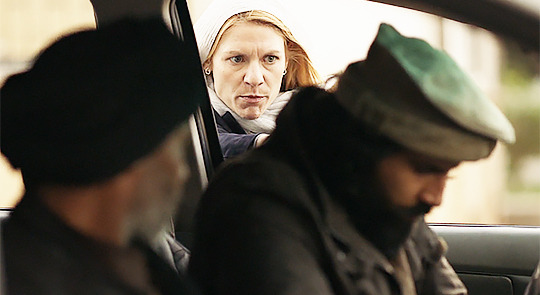
We’re still divided on the merits of the “Carrie has to save Samira” storyline, but the camerawork here, with Carrie’s armed hands appearing out of nowhere, was pretty cool.
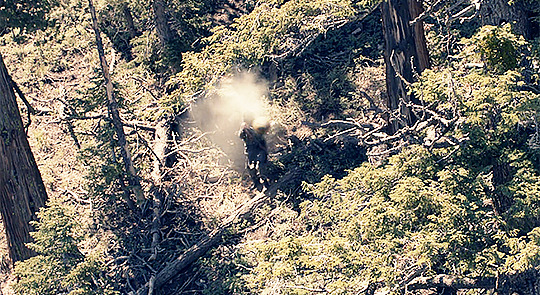
This RPG shot was one of the cooler special effects the show has done in a while. The entire sequence of Chalk One looking for Chalk Two was tense and thrilling and extremely well-executed.
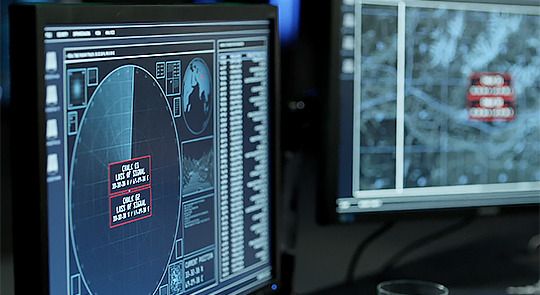
Bringing us back to the ops room, the “LOSS OF SIGNAL” projected now for both helicopters is pretty chilling.
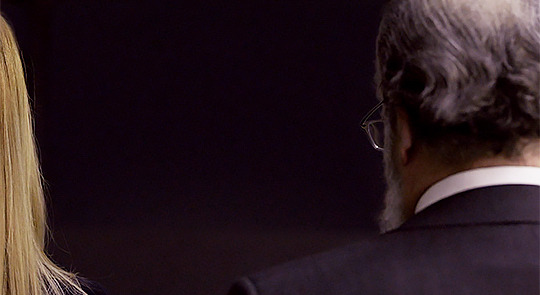
This is now Sara’s favorite shot of the entire series and we’d be remiss if we didn’t mention that it’s another over-the-shoulder Saul shot. This time he observes one of the crowning achievements of his long career literally blowing up in his face.
Visually, this shot anchors the viewer back to the Carrie/Saul relationship, the central one of the show. The black blankness--and the failure it represents--engulfs the frame.
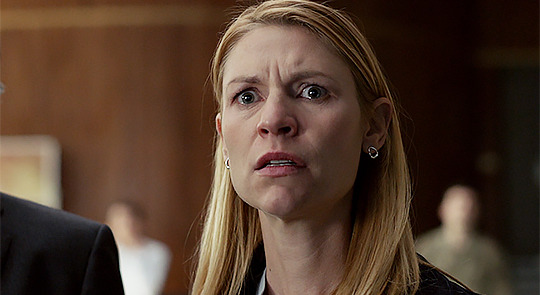
We love the choice to end the episode on Carrie alone. It refocuses the event back to her. The horror in her eyes, welling up with tears, is palpable. How does Carrie feel? Alex Gansa explained that the writers wanted to create a new 9/11 with this maybe-assassination of the president. And it’s a fitting bookend for the show in many ways. In Homeland’s pilot, Carrie says she “missed something that day,” misdirecting blame to herself for not preventing 9/11. Now, in the final season, the show seems poised to tell a story in which Carrie is blamed for the “new 9/11.”
Strap in, folks. It’s gonna be a rough ride.
2 notes
·
View notes
Text
March 14th-March 20th, 2020 Creator Babble Archive
The archive for the Creator Babble chat that occurred from March 14th, 2020 to March 20th, 2020. The chat focused on the following question:
How do you react to readers predicting your plot twists?
chalcara [Nyx+Nyssa]
Depends when they do. A page or two before it happens? Both of us get to feel clever. Yay! Months ahead? Well, obviously the thing I thought a a big twist ain't it, so I get to decide what other thing to focus on. I usually don't change the plot on reader predictions, but I can always change how a twist is presented from "Big surprise! Bet you didn't expect that" to "Well, ain't it neat to FINALLY have confirmation about that thing?"
Funnily, the best plottwist I ever wrote was in my now defunct comic. I thought it was obvious, but my few readers went "WOAH, didn't see THAT coming." So these days I try to just write the story and let the twists fall where they may.
Pistashi
ASDFPHIaewpf a friend of mine was reading my comic and he was making a lot of theories, a bunch of them was way off but he managed to be 100% accurate about one of his theories and I just started laughing nervously when he talked to me about it before it happened in the comic. This was years ago and the thing already happened and it's not a big deal anymore, but at the time I felt proud to write something that was obscure enough to not be on the reader's face but at the same time having someone figure it out after connecting the dots
I have little twists that happen in a more funny way, and it's usually used for comedy, and my readers seem to like it
but that's probably because of the expectations in humor coming from my writing style
which is usually bad puns and character reactions to absurd situations
and I agree witch chalcara, sometimes we can feel like we failed a plot twist when people see it from miles away
which is true, but sometimes even when they figure it out it's best to leave it as it is
I've seen a lot of writers fucking up their stories by changing plot twists that were stablished just because "people found out too early", and retconing a lot of the story in result
like, making a plot twist consists in creating some kind of foreshadowing
to make the twist not seem too forced and taken from nowhere
also to make it rewarding for those who searched deep for those clues
idk I love these little foreshadowing/clues we can leave for our readers
to make the twists even more powerful and meaningful
RebelVampire
I want to second a lot of the above. A plot twist should not be completely unguessable. Because if nobody guesses it, it means to most readers it's gonna feel like it makes no sense and came out of nowhere. The goal of a true twist is to have as few people as possible guess it but then when it's revealed, the reader smacks their head going "how could I miss all these clues."
Pistashi
exactly
Deo101 [Millennium]
Readers predicting things usually makes me lead with "oh no, I'm predictable!!!" And then makes me thing "wait, no, it means they're picking up on the hints I've left behind." Though sometimes it's predictable, like if someone guesses the actions of the next few pages, that's less of the readers picking up on hints and more just guessing right. But guessing big plot things, j think, is a reflection that I'm making things as clear as I need to, and I'm rather fond of it
Tantz Aerine (Without Moonlight)
99% of the times I am delighted if they guess the plot twist. I like it when I feel like my readers are on the same page as me (pun ...maybe not intended?) and see where things are going. Since my stuff is character driven, it tells me they can read the characters and their personalities well enough. However there was this one time when I had intentionally depicted something that was not going to be the historical norm (namely the p-51 mustangs' coats of paint on a cruiser in the opening scene of my WWII webcomic Brave Resistance). A war history buff called me out on it IMMEDIATELY saying "wait, these aren't how they're supposed to be!" and nearly spoiled the entire plot on page 2! I had to DM him to tell him to tone it down, and explain to him why the planes where the way they were. He apologized and stopped, but I'd wanted to throttle him for a while there
keii’ii (Heart of Keol)
I agree with Rebel re: the purpose of a plot twist. In that sense, though, I don't think my story even has plot twists. There is no moment anywhere in the story where I want the readers to go "how could I have missed all the clues!!!" ... On the spectrum of brainy vs hearty, my story is very close to the extreme end of hearty. Like, think of stories like The Little Prince or My Sweet Orange Tree. Even when unexpected things happen, it's never about the brilliant reveal. The most shocking thing in My Sweet Orange Tree comes out of nowhere, and it works for that book. Heart of Keol is a lot like those two in this regard. Not exactly the same, but pretty dang similar!
So back to the question, honestly? I want people to be able to guess. The usual bane of my existence is the opposite problem: people not knowing wtf is going on. My story isn't supposed to draw its strength from its surprises, so guess away (edited)
eli [a winged tale]
I love it when the reader guesses the gist of the plot twist a few pages just before the reveal. I sort of follow the novel structure idea that the reader should see what’s coming next right before it hits them, hence rewarding their investment in the story. Wild speculations without the clues I’ve planted are interesting. It does make me wonder if I relied too much on tropes or left too big of the crumbs. That being said, I’m not too fussed by readers predicting the general directions of the plot because it’s all about the character reactions. Could they predict that too? Maybe, to a degree. But there are a lot of subtext I try to write in my characters that give some nuances that I feel may entertain even those who guess correctly how the story would go. TL;DR: guess away. Love reading theories. The story is set so I won’t be changing anything big but perhaps layer the reveal with subtleties.
Cronaj (Whispers of the Past)
I've actually never had readers guess what's coming next. I mean, unless you count obvious, broad stuff (such as "the MCs get together"). I mean, it IS a romance. But in regards to big plot events, no one has gotten remotely close with their predictions (which kind of surprises me, because I drop clues everywhere). To be fair, I'm only a chapter in, so I guess it makes sense. But I am excited for the day when people finally guess
eli [a winged tale]
Same Cronaj! The predictions I’m speaking of are from my betas reading the entire script I love it when then go—- “omg this [plot point] must mean [reveal!]” .... right before the reveal
Feather J. Fern
If anyone does pick out certian plot twists I will be like "Yesssss people do think like me, I am not crazy" XD because most of my twists are all shown from the start through hidden background things so if people found them I am excited they took time and effort to figure out twists
LadyLazuli (Phantomarine)
I love it. I haven’t been disappointed about it yet, and I don’t think I will be. It doesn’t make me change the twists at all - in fact, I’ve even shifted some story elements around to give the readers even more confirmation that they’re right, earlier on in the plot. I want to reward them with a treat, and now they can revel in their cleverness a bit longer Hee hee.
Eightfish (Puppeteer)
I love it too, but I don't change things to make readers more right like LadyLazuli does. Sometimes I'm tempted to, though! My readers have good ideas!
Tuyetnhi (Only In Your Dreams!)
I like plot twists so I like to set a hint of them off early tbh (edited)
but I try not to make it too obivous :3c
tho for those who like to guess, I welcome it. I like hearing folks and their interpretations even if it's not what I'm going for too lol
LadyLazuli (Phantomarine)
Admittedly, a lot of it is due to the nature of the medium. I know that webcomics take ages to get to major reveals or spoilers - I can wait to totally-confirm things, but I can't wait to... almost-confirm things? I don't want people to get tired or frustrated. I know I've gotten angry at anime shows that take 20 episodes to confirm something we guessed at episode 1, so I like when these things are all but confirmed early on. It can be really fun to know a secret that, maybe, the heroes don't know. It gives an extra layer of STOP, NO, DON'T GO IN THERE! in times of danger
But given my propensity to practically s c r e a m my spoilers to people who I can trust with the plot... a lot of it is just me bursting at the seams wanting to say YES YOU'RE CORRECT.
Patience and restraint. Essential things in webcomics
eli [a winged tale]
Indeed! So much patience needed I do love some excellent plot twists executed just chefs kiss
Eightfish (Puppeteer)
Yes! I just want to tell readers, "Oh God, you're right! Good job!" But instead I usually respond with a ":)" or "I like this analysis!" Which I think is basically just confirming it. But if it's a real life friend? I cannot resist from telling them everything. I've even spilled spoilers in this chat before, trusting that most people here haven't read my comic. Kind of backfired when I reached a major plot point and someone commented, "She's been waiting to bust out this plot point for so long." Oops, guess someone did read my forum posts. But even if I did spoil things in the comments, is it really that big of a deal? I'm the kind of person where spoilers don't detract from my experience of things and sometimes even adds to it. But some people care about spoilers, so.(edited)
eli [a winged tale]
Haha yeah it’s honestly so freeing to just tell someone about the spoilers
Here’s what I have planned that will wreak the readers muahaha
keii’ii (Heart of Keol)
Past me could super relate to that! But these days I don't really want to TELL people? I'm not sure if that's because I've changed as a person, or if it's because this story is different from my previous ones. That being said, my patience is not infinite. I am itching to SHOW people. Can't wait to get to those Big Scenes
"Big" is a weird adjective here because they're very small scenes in some ways. Very intimate/personal
But... you guys know what I mean. The scenes that every longform webcomicker is dying to get to
Mei
Oh gosh, I agree that plot twists shouldn't be entirely out of the blue, since it's nice to have the hints that give people the crumbs to follow a trail. But like, since I write a lot of these chapters way in advance, and if I had the chance I'd love for them to be readable in one go as opposed to a page per week, I fear that I'm boring people with a predictable punchline? That being said, I get so many comments that predict the end of the chapter or the punchline or the joke. And I'm always like "haha maybe????" but inside i'm like "oh my god, they got me, THEY GOT ME"
Ohh yeah keii I get what you mean
the scenes you're like, checking your watch, checking your current pagecount, and thinking "soon I'll get to draw it, and it will be marvellous"
eli [a winged tale]
Oh gosh those scenes for me are at the finale
keii’ii (Heart of Keol)
TBH last time I got to one of those scenes (which was very recent), my anxiety skyrocketed because I was expecting someone to say something harsh. Because it happened in all of the previous ones. But this time it went well, so hopefully the future ones will, too?
eli [a winged tale]
Yay!
Deo101 [Millennium]
I think for me, I worry more than anything that it will ruin things for other readers, rather than me worrying so much about someone guessing right or me sharing spoilers.
keii’ii (Heart of Keol)
Someone DID say something harsh, but it was right before the actual scene and not about the scene and a lot of people got fed up with their attitude so I felt like it wasn't my fault, lol
eli [a winged tale]
Ruin things for other readers? Oh like someone predicting correctly in the comments?
Deo101 [Millennium]
Also yay! I always get anxiety about those kinds of scenes
Yes, someone predicting Something
keii’ii (Heart of Keol)
Well thought-out predictions are a lot of fun to read though, as a reader going through the comment section
eli [a winged tale]
I guess I stopped minding it and now embrace it they could be wrong or right and who knows until we get there~
Oh totally!
Deo101 [Millennium]
Oh I don't mind so much, but that doesn't mean I don't worry a bit too!
J like reading them for me, but I still think "I wonder if this will ruin it for someone else"
keii’ii (Heart of Keol)
Occasionally there are problems with Korean webcomics that were originally webnovels? Because people who've read the novel version sometimes spoil things in the comic comment section, and that's not cool. They're not even theorizing, they're straight up spoiling.
Deo101 [Millennium]
:(
eli [a winged tale]
Oh no that’s bad
keii’ii (Heart of Keol)
But if people are theorizing, and the theories turn out to be right, that's all very fun IMO!
Mei
ugh when people spoil things it irritates me to no end. Let people enjooy it for what it is!
and yes!! that's one of my fave things too
Deo101 [Millennium]
Yeah, every reader is different though. I have some people who explicitly have asked me not to share spoilers, and others who kinda beg for them! So I worry if some people don't like to see predictions (I know my dad doesn't like when I guess things in a movie)
Mei
theorising, discussing with other fans, just chatting about what you think may or may not happen
keii’ii (Heart of Keol)
Sometimes you even see comments like "Hurry up, Konans! I'm too tired to think, so post some good interpretations/theories!" lol (Konan as in the detective... in Korea, it's a term for hardcore theorizers in webcomic comment sections)
Oh, I think movies are different
I don't want any form of verbal remarks while I'm watching a movie
Or like, if I'm marathonning a show with my bro, we're entirely silent except between episodes.
But comment section is like, you have to actually go there.
Deo101 [Millennium]
Some people might be like that for comics, too. Idk. I'm not trying to say i don't like to see theories I'm just trying to think of everything that makes me worry about them is all.
And for me, the biggest worry would be that someone seeing a prediction would make them enjoy my comic less. It doesn't mean I necessarily think it's all that common, but I refuse to say it won't happen I think
snuffysam (Super Galaxy Knights)
Personally, I think that's not an issue unless you confirm the commenter's theories
like I've seen theories for things online where my first reaction is "that's dumb, that would never happen" and then it happens
some people will latch onto another person's theory, others will reject it, but i don't think people will take it as a spoiler in advance
Cronaj (Whispers of the Past)
Yeah, theories are just theories
keii’ii (Heart of Keol)
I mean I know some people don't even want to hear other readers' theories, but if they are that extreme, they need to avoid the comment section on their own IMO?
Cronaj (Whispers of the Past)
^^
keii’ii (Heart of Keol)
like... cool, I respect your preferences, but you can't hold me responsible, pal!
Deo101 [Millennium]
Again I'm not trying to say I don't like theories or I don't want them I'm just trying to think of all potential issues with them
Cronaj (Whispers of the Past)
Granted, I'm one of those people who will scroll through the comments and read theories because I like to see all the smart people reveal the clues to dumb people like me
keii’ii (Heart of Keol)
I can relate to that
@Deo101 [Millennium] Understandable! Just don't be too hard on yourself for things that you can't control
Cronaj (Whispers of the Past)
Those geniuses that remember details from 30 chapters ago and somehow manage to connect the dots
Mei
Exactly! The comment section is there, but it's their choice to read it, and also like it's not your fault either? like they're not YOUR comments
haha in our RPG games sometimes people drop character plot hints way at the start of the campaign, and my friend will turn up, 7 months later, " remember when Character A said this? I remember"
and everyone's like "what the heck?!" some people are just detectives
they can see it, they see the matrix
snuffysam (Super Galaxy Knights)
Anyway, I love when my readers theorize! I don't believe any reader has guessed any of the major plot twists in the first two books, despite there being enough evidence beforehand to make a guess (closest was "whatever zebugu's doing, it's not evil this time" but not the specifics of what he was doing). Though, if they had, I wouldn't mind, since that's max two years they gotta wait before the reveal (and that's assuming they guess it on the cover page lol). Book 3 is a different beast - strictly speaking, there's enough evidence for someone to predict both twists at the end of the book, right now. And... that may be an issue, given that this book will take over three years to reach those twists. So... we'll see if anyone guesses them. What's weirdest is when people guess things almost correctly with absolutely NO hints. And it's some super specific and minor thing like "Mizuki is secretly the reincarnation of a thousand-year-old dragon". Like... there haven't even been dragons mentioned in the comic up to this point. Nor any events from a thousand years ago. And like, that's not exactly the truth, but how do you get THAT close???(edited)
Cronaj (Whispers of the Past)
They see E V E R Y T H I N G
eli [a winged tale]
Sometimes it’s a trope thing? But yeah wild speculations can be so wild but so spot on
snuffysam (Super Galaxy Knights)
but there aren't any fantasy creatures in the comic, at all!
except a squid with feet!
eli [a winged tale]
Lol whaaaat then yea not sure where the dragon part came from then
Cronaj (Whispers of the Past)
Sherlock Holmes readers lol
eli [a winged tale]
Yeah detective Conan lol
Deo101 [Millennium]
Joke gone awry
snuffysam (Super Galaxy Knights)
basically
Feather J. Fern
Well I mean I have crack theories about random people being random things too so...
I can see where they come from XD
sagaholmgaard
tbh I think my comic is fairly easy to predict as it has a pretty straightforward narrative xD but I don't have that many readers yet so maybe in the future! I would have fun reading people's guesses and predictions :D
Eightfish (Puppeteer)
AAA my readers right now are so accurate. They're so smart. They make me want to post my entire buffer right now and prove them right.
sssfrs (JOE IS DEAD)
I wonder if anyone would be able to predict the next things happening in joe is dead
Eightfish (Puppeteer)
I at least have no idea what's going to happen next but am looking forward to it anyways(edited)
🌈ERROR404 🌈
i know that it's only because TH is still quite new, and I haven't gotten to the meat of the story yet, but i like reading some of the really out there predictions and worries i get in some of the comments lol
AntiBunny
I will never tell someone if their guess is right or wrong, but if they do guess it, it probably means I'm foreshadowing well.
Then again I also find myself writing by the seat of my pants, so plans are subject to change.
kayotics
The original question mentions “plot twists” but I’m never trying to make a plot twist personally. I may intentionally obfuscate things, but I don’t ever try to do wild twists and turns. So when a reader predicts what will happen, I actually don’t mind, and I’m pretty happy that it’s following a logical chain of events. On the other hand, when readers are totally off base, I think that’s REALLY fun.
Cap’n Lee (Flowerlark Studios)
Most of my readers feel that my comics are twisty and surprising, but I often get at least one reader who correctly guesses what will happen, even if sometimes they’re joking or think their theory is wild and out there. Honestly it feels pretty awesome to have a reader shrewd enough to puzzle out the clues, because that means they’re really paying attention. I don’t have a very big audience and most of the time they’re silent, so anytime someone leaves a comment that is carefully thought out, it makes me really happy. As for the times readers joke or wildly speculate but inadvertently hit the nail right on the head, I find those very amusing. I really love stories with well done twists and turns, and so I try very hard to execute good plot twists that have enough foreshadowing to be ‘Aha!’ moments rather than ‘Where did that even come from?’ moments. So I love when readers are both properly misdirected AND when they pick up on the clues and deduce the twist.(edited)
DanitheCarutor
Does my comic have plot twists? I don't really think about it. People have correctly guessed things that will happen in a chapter, someone even guessed correctly on the climax when a character named Daniel was introduced... well, it was more like "I hope things don't turn out like -blank-!". I don't mind, just because they guessed something correctly doesn't mean they know how the story will go for sure, it just means that they're theorizing and that is something I always encourage. I don't think that means the story is boring or predictable either, some people are just really good at that stuff. Even though I don't think my comic is very mysterious/unpredictable it's still impressive when someone pays attention to all the little visual and dialogue details, then guessing correctly about a future event based on them. Nothing more flattering than someone enjoying your comic enough to analyze it.
Lmao! I can't tell you how many movies I've ruined for people because I guessed a plot twist correctly.
Cap’n Lee (Flowerlark Studios)
Haha, honestly same. I’m not allowed to make predictions during movies or TV shows anymore bc I almost always get it right. XD Webcomics I find a bit more unpredictable, though, because most of them aren’t nearly as formulaic as mainstream film.
DanitheCarutor
Yeah! Even if it's not obvious most of the time movies go by a pattern or set of traits, once you learn how they go a film or TV show becomes a lot more easy to figure out right away. The only time I'm stumped is when the movie is really surreal or absolutely awful. That's the nice thing about webcomics in a way. I assume a lot of creators haven't had professional training, and we want to tell a story more than be entertaining to the masses, so stories are less predictable. They don't always go by a formula, which can be refreshing.
Capitania do Azar
Aw man I would love to have some theories, but for the time unfortunately I don't I'm always super curious about how readers interpret things given they don't have an inside view of things
#ctparchive#comics#webcomics#indie comics#comic chat#comic discussion#comic tea party#ctp#creator interview#comic creator interview#creator babble
1 note
·
View note
Note
For the fanfic ask: D, S, and U ;) thanks!
For wornquillsandspilledink’s Fanfic Ask Game:
D: Is there a song or a playlist to associate with your fics?
Hmmm… I’m not a particularly music-based writer - a lot of my inspiration comes from other stories, or visuals, or personal experience. Usually musical associations come afterwards, once I’ve got a scene/character fixed well enough for a song to resonate with them. It also means that I tend to associate songs with fic-moments, characters or fandoms-in-general rather than with a single entire story. So, a list:
As mentioned before, the opening Instrumental of the Disturbed Sound of Silence Cover is a good match to the ambience of YJ:DW Chapter 15.
Coldplay’s Paradise gives me angsty S1 Artemis vibes.
For Danny Fenton, Coldplay’s Gravity and Simple Plan’s Astronaut get the sad feels going.
Most Imagine Dragons songs tend to make me think YJS1 due their being used in a bunch of super talented fan-animations and AMVs.
More broadly the general emotional tone of ColdPlay’s Fix You and The Fray’s You Found Me kind of underscore sadder, heavier moments of writing.
There was a lot more Sad™ and Coldplay in there than I expected. Whoops…
S: Any fandom tropes you can’t resist?
I’m one of those annoying Tropes-are-Tools-not-Guarantees types so there aren’t many tropes I can confess to seeking out for their own sake, or deliberately inserting into all of my stories. That said, I tend to be pretty characterisation-focused (even though I like long-fics to have some kind of accompanying plot too), and there definitely some tropes/patterns I’ll gravitate towards:
Believable Depictions of Grief/ Trauma and Healing/ ClosureI enjoy finding stories that actually address the hard experiences or losses that characters have gone through, that the process is messy, and ways they might attempt to work through/ around it, while still letting them be themselves, have moments of levity, live their lives and eventually reach a point of closure. Grief depicted like this is weepy, delicious, catharsis and I am here for it.
Trust and RevealsI can get a bit frustrated with stories (especially crossovers) that have characters just know or decide to immediately overshare secrets and personal information. Always more satisfied when those secrets are treated as secret by the narrative, with characters having to sleuth it out or build genuine respect and trust before learning/earning the truth.
Intrigue and the Suspense of AnticipationLove me some Fair Mysteries. Also when creators are willing to play games with the audience, letting us reach the answer ahead of the characters and wait in anticipation for the penny to drop. Good stuff.
Actual Communication and MisunderstandingsThere’s a certain sort of masochistic anticipation that comes from seeing two or more characters end up in conflict because their own personal biases and hang-ups are causing them to misrepresent and/or read things into the other person’s words/behaviour that aren’t actually there. Usually followed by either a fight or moment when someone says something that throws that misinterpreted reading off-balance and the whole truth ends up being brought to light and resolved. I also like this because it lends itself well to grey-on-grey conflicts; no clear “good vs bad” but instead all sides somewhat sympathetic and somewhat at fault for poor communication.
Character studiesKind of self-explanatory: stories that focus in to put the microscope on a single character’s emotional reactions to, and reasoning behind, specific canon behaviours/ events make me happy. The more believably close to canon-characterisation the happier this gremlin will be.
U: Share three of your favorite fic writers and why you like them so much.
Fair warning: I tend to read pretty widely, so this has the potential to balloon into a huge list. While I could definitely recommend some of the classic fandom bigs like BNHA’s PitViperofDoom and Laquearia, or DP’s Haiju (all of who deserve it and you should check out if you haven’t), I think I’ll take this chance to ping some writers from older/ wider fandoms:
tactfulGnostalgic’s Into the Spiderverse The Family Brooklyn Series. Hits a lot of my personal trope favourites (character studies, reveals, believable depictions of grief, actual communication, accepting oneself) and also because oh my gosh that prose. There’s an almost Markus Zusak-ian quality to their writing at points and the rest is just impeccable and fun. Also packs some really good snappy dialogue.
skyflower51′s Skyrim storiesI really enjoy the environment design, side-quests and lore of Skyrim, and Skyflower51 does a great job of writing interesting characters to fill the blank-slate player-insert MC position, fleshing out in-game plot-lines and characters with much more nuance and detail by having a specific personality from within that world interact with and push them beyond what the limited RPG writing would allow, as well as exploring the possible identity/responsibility issues that come with being thrust into the role of legendary hero. If you want a look at what Skyrim could be if written as a fantasy world instead of a videogame backdrop, these will probably scratch the itch.
Blackfriar’s Young Justice storiesOh hey, a fandom I actually write for. Lovers of fluff will want to tread carefully here, as their stories are frequently rated M for angst and violence with good reason. That said, if you like white-knuckled suspense, horror and anguish, or seeing Batman, Robin and Kid Flash being trialled by difficult situations both in and out of uniform, these will certainly get you your fix. They also have some crossovers with Under the Red Hood which may satisfy those disappointed by YJ’s lack of Jason.
Also want to give a quick shout to Daruku Janubu/ DJAnubis, whose art for the TTxDP fic Turning Tables was what first got me into fanfic, and whose own story, Unfair Justice, made me cry.
Thanks for playing!
2 notes
·
View notes
Note
Hello, how should I go about writing a fantasy POC society? The culture I wrote is pretty alien, so it's not recognizable or based on any real life culture. Is it enough to describe them as dark skinned/haired/eyed? I dont really describe features all that much, I tend to focus on actions, clothes and other more character defining traits. Should I pick a real ethnicity to base it off of, if only to have a clear image of what Im going for? I'm pale as heck and want to do it justice. Thank you!
Well, I’m just one person with one opinion so I can’t speak for everyone but I can try my best to help you. There is a lot of nuance with what you’re trying to do, and the way you write this society will depend on what kind of POC you are depicting, what time period, their place in the world, etc. There are different histories, implications, stereotypes, etc that come with writing different fantasy ethnicities, so not every rule for writing a society of black people, for example, will apply to writing a society of Latinx people. So whatever ethnicity/ies you are basing your society on, you should do research on what you’re specifically working on so you don’t fall into harmful tropes that have been used to represent that community before. My personal method is to make my own cultures rather than basing them on real life. I’ve used real life events and cultural aspects to inspire me here and there but I try to make as much as possible come from me. That way there’s less of a chance that I’m taking something that belongs to someone else and is not mine to use. And I think if you sufficiently worldbuild history, climate, borders, natural resources etc for the area in which you are writing the society, you can also use those influences to greatly inform that society so that it’s more grounded within the fantasy world rather than pulling from our world.
Something I notice a lot of white people getting wrong when attempting to write fantasy cultures of POC is that they make the entire society a monolith with the same exact looks, clothing, values, slang, religions, schooling, etc when the reality is so far from that. Many societies are represented by a wide range of appearances, skin tones, traditions, holidays, dialects, family structure, and more but we only think of one kind of person when we think of a certain ethnicity or race. Like, think of the difference between the stereotypical New Yorker vs the stereotypical Texan vs the stereotypical Californian. They dress and speak and vote differently, live in different climates, eat different food, you know? (Sorry if you’re not American :(, but hopefully you get my drift.) So definitely keep that in mind: non-monolithic cultures. Diversity within one culture. Immigrants exist, multicultural families exist, cultural diffusion exists. Another painful and unfortunate thing that happens often with white fantasy is “ENGLAND ANALOGUE, FRANCE ANALOGUE, SPAIN ANALOGUE, OH AND THERE’S THE ENTIRETY OF AFRICA/ASIA SMUSHED INTO ONE COUNTRY AND WE SEE A CHARACTER FROM THERE EVERY ONCE IN A WHILE.” Avoid that. Another thing I would do is look at how fantasy writers, ESPECIALLY writers of color, write cultures. I feel like NK Jemisin’s The Broken Earth trilogy provides several good examples of ethnically diffused societies and really unique cultures that arise based on the world’s history and geopolitical influences. Hopefully that helps :)
20 notes
·
View notes
Text
“Is She Real?” and Other Distant Dreams within Dreams: Fifteen Films Which Are Completely Their Own Thing
There are films which stick to one’s mind due to their greatness as well as those which do the same for their extreme inferiority. Mediocre films have a tendency to leave one’s mind like an uneventful day once the night falls. Then there are films which one keeps coming back to because they are completely their own thing. These are films which stay in memory due to their striking originality. They might be masterpieces, and thus greatness could be among the explanans for the phenomenon of preservation, but they do not have to be. In terms of quality or personal preference, these films might be somewhere in the middle. They elude the nightfall of oblivion on other grounds. Although their survival of the test of time can thus be explained by reference to uniqueness, it should be emphasized that uniqueness in this case does not mean any conventional weirdness or doing the extraordinary. The notion I am interested here is not what you might call in-your-face uniqueness (feel free to insert a list of contemporary “indie” directors). Rather, I am interested in the unique unique. I am talking about films which stay with you, but you can’t really point your finger at them and say why; they stay with you not because of quirkiness, of artistic mastery, of historical significance, of intricate story or peculiar characters, but because of an utterly original approach to cinematic discourse -- which might, of course, include all of these to altering degrees. Such originality might be less obvious, but it is there, it is real, and it is singular.
The following list of fifteen unique films will not include the obvious candidates from the first films which did this or that to the weird-for-the-sake-of-being-weird adventures. I have tried to resist the urge to go where the fence is lowest and make a list of “weird movies”; instead I have tried to focus on a more subtle notion of uniqueness. The challenge as well as the allure of list-making are the constant limitations one sets for oneself. That is also the reason why no director pops up twice in the list. Another yardstick for a unique film of this kind is that the film in question cannot really be compared to anything else. Or if it can, the comparison remains loose at best. Hence the absence of films from auteurs whose bodies of work form distinct unique wholes but precisely as wholes, not singular parts. Jean-Luc Godard, Jean-Pierre Melville, Robert Bresson, Douglas Sirk, Howard Hawks, Yasujiro Ozu, Jean Rouch, Michelangelo Antonioni, you name it. All of them managed to craft an original cinematic discourse, but they developed the execution of that discourse in countless films that form an admirable whole of aesthetic consistency.
So, here, I am not interested in cultural peculiarity, a director’s originality, or uniqueness within a genre. I am interested in a slightly different kind of personality with regard to cinematic discourse. Although each of the following fifteen films exemplifying this unique uniqueness obviously belong to a director’s oeuvre, I believe that all of them stick out in one way or another. They have not been listed in order of personal preference or quality but in terms of uniqueness (which is, of course, a notion difficult to define, and which is a notion not completely free from personal preference and quality, I’m sure). As such, they tell another story, perhaps unique by nature, about the enigma of the seventh art.
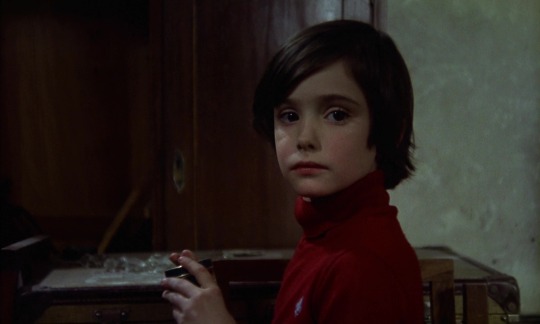
15. Cria cuervos (1976, Carlos Saura, SPAIN)
It is an indescribable delight to witness Carlos Saura’s magnum opus Cria cuervos (1976) unfold before you for the very first time. Since the film, which tells the story about a young girl and her two sisters who try to cope with growing up after the death of their parents, was released one year after Francisco Franco’s death, it has become something of a standard interpretation to watch Cria cuervos as an allegorical tale of "the children of Spain” coping with the loss of their patriarchal leader in a new social reality. Yet any serious spectator will tell you that this is just one side of the film’s multi-layered coin of meanings. Its ambiguous structure might tie in with the prevalent narrative tendencies of Saura’s generation of left-wing Spanish directors, but it also works as a metaphor for the vague human mind. Not only cutting but also panning between the present, the past, and an imagined future, the film unfolds as a poignant story about loss and longing, the desire to be somewhere else, something else, some other time. One of the best films about childhood ever made, Cria cuervos denies romantic innocence without falling into the trap of naive pessimism. It embraces childhood as a part of being human, being mortal, being without something, being toward loss, being as always losing something.
The most famous scene from the film -- and an example of just this -- is definitely the scene where the young girl, played by the unforgettable Ana Torrent, listens to a pop song “Porque te vas” by Jeanette, a nostalgic love song about leaving that reminds the girl of her mother’s death. A touching moment beyond words that can only happen in the cinema, this scene exemplifies beautifully the tendency of children to cling onto seemingly insignificant objects that they will carry with them for the rest of their lives. The images where the girl quietly moves her lips in synchronization with the song are breath-taking and heart-breaking. The way how Saura executes this brief scene, in one sequence shot, is just so original, so inimitable, and so Saura. The emotions are not clearly visible on the child’s face, most likely because she is unable to understand let alone express them, but they come from another place that lies somewhere in between of sound and image. The context for this scene is her frustration with her aunt, who she briefly impersonates (”turn down the music”), which further pushes the obvious meanings and the obvious feelings outside. Maybe it is just a random pop song? What is left is the ambiguity of meaning and feeling. And that resonates. Powerfully. I have never seen anything quite like it. These are unique images which speak loudly about the power of cinema. Some might say that what makes Cria cuervos as unique as it is are Ana Torrent’s dark button eyes, but, in reality, it is how Saura frames them, how he lights them, and how he cuts from them. Cria cuervos has no single detail which would exhaust Saura’s style; yet his sense of composition, his choice of shot scale, his sense of color, sound, and movement are in every second of the film; they are characterized by the subtlest nuances which distinguish an ordinary beautiful object from a true work of art.
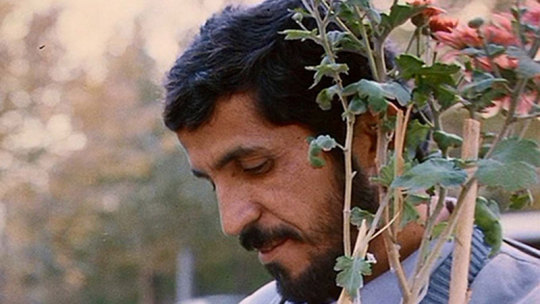
14. Nema-ye Nazdik (1990, Abbas Kiarostami, IRAN)
Abbas Kiarostami’s penchant for meta-cinematic discourse, which addresses enduring human themes through postmodern questioning of the possibilities of representation, reaches a peak in Nema-ye Nazdik (1990, Close-Up). Based on true events, it tells the peculiar story about a poor Iranian man, Hossain Sabzian (played by himself, like all the performers in the film) who pretended to be the famous Iranian director Mohsen Makhmalbaf for the Ahankas, an upper-class Iranian family to whom Sabzian told that he wanted to use them and their house for his next film. When Sabzian’s hoax was revealed, the Ahankha family sued him only to drop charges after Sabzian’s intentions proved out to be more complex than those of a traditional impostor. Kiarostami mixes documentary footage with staged scenes of what happened to the extent that it is impossible for the spectator to make a distinction. Not because of slyness, or Kiarostami’s talent to cover his tracks, but precisely because the distinction disappears: when the people involved are placed in front of the camera, acting out what has happened in the not-so-distant past, there is no longer a sense of staging but of being.
In a marvelous moment of poetic intuition and cinematic genius, Kiarostami’s camera picks up an empty spray can rolling downhill on asphalt. In the spirit of the “phenomenological realism” of the Italian neorealists, Kiarostami’s objets trouvés, like the empty spray can, are not symbols for something else. It might be juicy to see meaning written in the code of the empty spray can, say, in terms of the looming void behind the roles we all play, but Kiarostami’s camera uncovers it as a mere abandoned tool. Heidegger would call it Vorhanden, a being present-at-hand, whose factual existence is obvious to us after it has lost its functional purpose in its appropriate context, its primordial being as Zuhanden, a being ready-to-hand that one surrounds oneself with in the everyday reality of practical life. Even if this coarsely rolling empty spray can was the postmodern alternative to Sisyphus’ rock, it would be more a metonymy than a metaphor. It is a desolate, cast-off tool whose lonely mundane being paradoxically charms us in its banality. It is, what we might call in the spirit of anticipation, the taste of cherry.
Here, in the peculiar zone between metaphor and metonomy, meaning and the lack of it (or independent meaning), inhabited by empty spray cans, lies the uniqueness of Nema-ye Nazdik. There is nothing holy or sacred in Kiarostami’s images. The material density of the rough texture of the depicted reality drains from them. The close-ups of the film -- whether in actual shot scale or in narrative intimacy achieved by precisely restrictive framing and extensive use of the off-screen space -- startle us with this banality of the facticity of being and the phenomenal surface of reality. The final close-up of the film shows us Sabzian, looking down, holding a bouquet at the gate of the Ahanka residence where Makhmalbaf has taken him to make amends. One senses the Chaplinesque tragedy of life in close-up. It is tragic because there is no comfort from contextualization; there is a factual detail thrown at us in its strange existential disclosure. A rolling empty spray can or a structured identity at ruins -- revealed, stripped, naked. The human theme of longing coalesces with the meta-cinematic theme of the possibility of representation as one feels the unquenchable thirst for escape, the yearning to be someone else in this banal world of objects-at-present. Where else in the cinema does one find all of this?
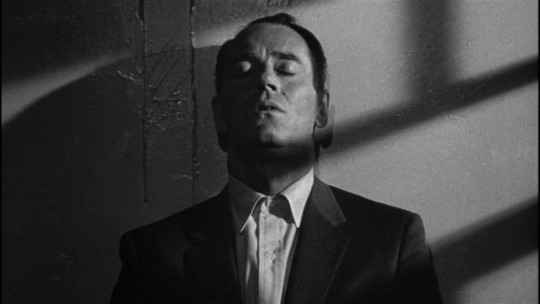
13. The Wrong Man (1956, Alfred Hitchcock, USA)
Although Hitchcock is definitely a genre director, meaning that he really devoted his whole career to the genre of suspense (whether in thriller, horror, espionage, or adventure), he made a lot of films which pushed the limits of genre aesthetics, conventional narration, and classical style toward unexplored territories in the land of film. Hitchcock’s legacy is in fact constituted precisely by his relentless desire to look for new ways of cinematic expression. The most obvious example would probably be the “trilogy” in which Hitchcock tested -- and, perhaps to popular opinion, failed -- the slow aesthetics of the long take: Rope (1948), Under Capricorn (1949), and Stage Fright (1950). Their uniqueness is admirable, and the two latter border on masterpiece, but the most unique of Hitchcock’s films is, I believe, The Wrong Man (1956).
If Hitchcock, the great manipulator of his audience whose “buttons” he loved to push, is placed in the group of directors who mastered formalist montage over realist mise-en-scène, following a heavily Bazinian distinction, we might conclude that The Wrong Man is the closest Hitchcock ever got to cinematic realism. Although the film does manipulate the spectator, guiding their gaze throughout rather than giving them the freedom of deep focus and multiplanar composition (the cardinal virtues of Bazin’s theory), its austere mise-en-scène, economic narration, and minimalist editing make it Hitchcock’s most Bressonian film. Interestingly enough, and this will bring us to the film’s uniqueness in a moment, Hitchcock’s biggest fan and André Bazin’s most famous disciple, François Truffaut first expressed great appreciation for The Wrong Man when it came out and later disowned the film in his famous interview book with Hitchcock [1].
The passage where Truffaut challenges Hitchcock, not in order to humiliate him but in order to get him to defend his artistic choices, is among the best parts of the whole interview book. Their discussion concerns the scene where the protagonist, played by Henry Fonda, is taken to his prison cell where he does not belong to because he really has not committed the crime he is being accused of committing. There is no dialogue or voice-over narration to tell us what the character is going through, but Hitchcock’s cinematic narration still visually focalizes into his internal, first-person point of view, while switching to an external, non-focalized third-person perspective in medium shots of the character in captivity. Hitchcock cuts between these medium close-ups of the character’s face as he is looking at something and point of view shots of the austere cell that serves as the object of his gaze. There is no music, no sound -- just stark images of a narrow, grey space. The calm cutting between these two types of shots manages to reflect the character’s inner life which becomes, so to speak, externalized by cinematic means. It is as though his mind extended to the space whose austerity became to articulate his experience of imprisonment, isolation, and, ultimately, loss of self. The non-subjective space turns subjective; its concrete features start to channel the character’s mental states in ways which contemporary directors like Lucrecia Martel have mastered.
The problem Truffaut has with the scene is its ending. The scene concludes with a medium shot where the protagonist leans against the wall of his cell, eyes closed, distraught, powerless. Suddenly, non-diegetic music starts playing on the soundtrack and the camera begins swirling in a circular loop around the character. As the movement of the camera accelerates, the music intensifies and finally reaches a crescendo coinciding with a fade-to-black to the next scene. Truffaut disliked this shot because it seemed to break with the Bressonian asceticism that Hitchcock had been practicing prior to it. It is also noteworthy to add that never again is there anything like this in the rest of the film (and thus the shot does break against the norm of consistency): The Wrong Man returns to its minimalist, Bressonian roots, letting go of the striking expressivity of such camera movement (which is not used to follow a character or reveal further details of narrative significance in the diegetic space). One might recall, for example, the unforgettable shot which dissolves the praying protagonist’s face with the “right man’s” face, and what a completely different feel that shot has to it -- it is something Bresson would never do, but it is something the Bressonian side of Hitchcock does.
Despite Truffaut’s challenge, Hitchcock refused to defend his film, disappointingly noticing that it was not that important to him. That might be the case, but it might also be that Hitchcock was not sure of his artistic choice, or he didn’t know how to explain his intuition, or he didn’t want to argue about such matters. Maybe he thought he had failed in his experiment. Either way, it is this moment which always gets me. It feels a little awkward, and it always pushes me just a little away from the film, to a strange borderline zone of cringe -- but, at the same time, it feels wonderful. It’s the moment where one can so clearly see Hitchcock’s legacy as an innovator and a re-generator, looking for new ways to make films -- and not always with success. It’s the moment when you realize that you are not watching Un condamné à mort s’est échappé (1956, A Man Escaped) but The Wrong Man. It goes against the realist style which avoids blatant and outspoken expression, but it goes so well with Hitchcock’s own style where a sudden cut to an extreme long shot from an extreme high-angle on the top of the United Nations building is completely natural. It’s also one of those moments, definitely alongside the great dissolve of the two faces, where one can sense the presence of cinematic uniqueness. Although I think Un condamné à mort s’est échappé is a better film, there is really nothing like The Wrong Man. From Hitchcock’s startling opening monologue to the inexplicable happy end, bordering on Sirkian irony, The Wrong Man is really its own idiosyncratic thing.

12. Lola Montès (1955, Max Ophüls, FRANCE)
Master director Max Ophüls’ final film and cinematic legacy Lola Montès (1955) is the definitive cult film. It’s strange, it’s wild, and its off-the-rails uniqueness made it a massive flop. It’s the stuff that dreams are made of... the dreams in cult film land. A lavishly told story about a woman with hundreds of lovers, who is now presented to us as a circus attraction, did not resonate with contemporary audiences. With the exception of the new film critics of Cahiers du Cinéma, who were to define the cinema of the following decade, everybody hated the film. To those who understood the magic, however, it was wonderful. To those who still do, it is beyond divine. The combination of box-office and critical failure with a huge budget and an unprecedented desire to challenge convention from the 50-year-old director, who was soon to pass away, turned Ophüls into a martyr figure for the new generation of French filmmakers. Like Orson Welles, Ophüls was -- to them in their own land -- a misunderstood genius, a maestro who died two years after the release of his final film that found too few kindred spirits.
What makes the case of Ophüls’ martyrdom so fascinating is the fact that on paper Lola Montès sounds like everything Truffaut et co. hated. It is based on a novel, its script has other writers in addition to Ophüls, it has an all-star cast (and without the obvious choice, the Ophüls favorite of the 50′s, Danielle Darrieux!), and it has lavish production values backed by a big budget. Does this not sound like le cinéma de qualité par excellence?
The fact that Lola Montès sounds like dull quality cinema on paper, however, does not mean that it looks like it on celluloid. And that’s what makes it unique. Known for his penchant for sumptuously elaborate camera movement (to the extent that a camera which is not moving on tracks simply looks naked in the Ophüls universe), Ophüls went an extra mile to make his forward-tracking dolly shots work in a wide circus arena without revealing the tracks. Resonating with the width of the diegetic space and the volume brought to it by such cinematography, Ophüls also widened his film into color and the CinemaScope aspect ratio for the first time in his career. Unlike anyone prior to him and few after, during a time when CinemaScope had not been around for longer than two years, Ophüls made the unexpected decision to play with the aspect ratio. For most of the screen time, we see the events unfold in 2.55:1, but, every now and then, when mood or character identification so requires, Ophüls narrows the aspect ratio back to the Academy ratio by placing curtains on both sides of the lens. The peculiar technique of altering the aspect ratio within shots in itself is enough to make Lola Montès unique, but the way it connects to the theme of the theater -- not only as the circus milieu but also as the publicization of the private sphere -- and the surprising yet accurate (which never feel too much on-the-nose) choices Ophüls makes in using it turn Lola Montès into a bizarre marvel.
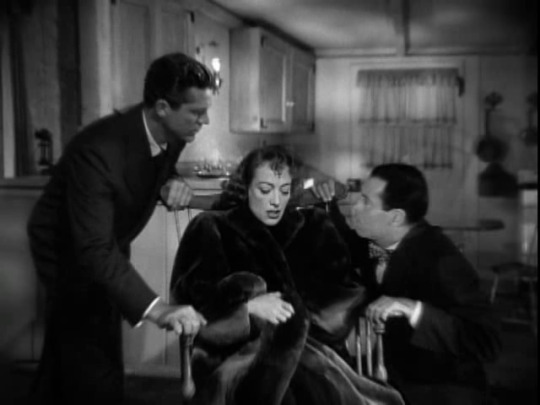
11. Daisy Kenyon (1947, Otto Preminger, USA)
On paper, again, Otto Preminger’s Daisy Kenyon (1947) seems like nothing but a love triangle done to death. Joan Crawford plays a woman who is having an affair with a married man, played by the impeccable Dana Andrews, but in the middle of their troubled affair -- that would suffice to constitute a love triangle -- enters a returning war veteran, played by Henry Fonda (the only actor to appear twice on this list!), who also catches the woman’s eye. The film unfolds as a series of moments which push the female protagonist to the embrace of one man or the other. What makes the film so unique, however, is its original cinematic discourse, its use of style and narration. In his admirably insightful new book on 40′s Hollywood, Reinventing Hollywood: How 1940s Filmmakers Changed Movie Storytelling (2018), professor of film studies, David Bordwell calls Daisy Kenyon “one of the most psychologically opaque films of 1940′s” [2]. Preminger’s cinematic narration is characteristically restrictive of narrative information. There is no voice-over, which would provide the spectator information about the characters’ inner motivations and feelings, but this is only made more ambiguous by the dialogue where the characters keep making contradictory statements about themselves and others. It is difficult to keep track of their mood swings as well as their cognitive discontinuities, and make any cohesive conception of their true motivations and feelings. This was yet to become the dominant characteristic of modern European cinema (mainly Antonioni, above all), but here it blends with classical Hollywood.
The film is filled with strange moments of peculiar, recurring pauses in dialogue which enhance an ambiguity that starts to feel bigger than the characters and their petty worries. Fonda’s character suddenly ends a moment of conversation with Crawford’s by saying “my wife’s dead” without receiving a response of any kind from his romantic interlocutor. Similarly, he nonchalantly proclaims his love to her -- “I love you” -- but gets no response in another passing moment of indifferent quietude. There are no typical responses nor are there typical initiatives. There are only words that try to grab onto something but most often miss their targets that perhaps never even existed.
The lack of conventional non-diegetic music, the use of deep-focus cinematography, deep space compositions, and lingering shots create a mood of emptiness and despair, which reflect a deeper difficulty in expressing oneself. This theme is articulated on the formal level of style and narration, but it also becomes knitted into the story world toward the end when the courtroom sequence plays with the ideas of illogical human behavior and the impossibilities of finding out what people have done and felt. When one of the two men and the Crawford character embrace one another in the film's final shot, it is equally impossible for the spectator to believe that this is the stable, happy end of a typical Hollywood romance. It is merely another dumbfounded pause, another pointless initiative, another unnoticed response, which will soon be followed by quietude, distance, and alienation.

10. Picnic at Hanging Rock (1975, Peter Weir, AUSTRALIA)
Australian director Peter Weir has made a lot of weak films (I am not a fan of the sentimental Dead Poets Society [1989] or the pseudo-intellectual The Truman Show [1998] -- though I do have a little thing for Fearless [1993]), but his breakthrough film, based on the novel by Joan Lindsay, Picnic at Hanging Rock (1975) is a real treat. A fictional account of the disappearance of three schoolgirls and their teacher during an all-girls boarding school’s picnic on St. Valentine’s Day in 1900, Picnic at Hanging Rock begins with a quasi-documentary opening text and concludes with an extra-diegetic voice-over discussing the case, making it seem as if the story was true. More than fooling the audience, this device guides them into another world, where something like this might have happened, and into the hypnotic trance of a mystery, all of which is enhanced, of course, by the first images of a foggy landscape and the girl’s words in voice-over:
What we see and what we seem are but a dream, a dream within a dream.
Weir’s greatest film leaves a lasting impression with its unique, impressionist aesthetics of pale colors, quiet sounds, soft focus, lush cinematography, eerie panpipes music, and an often strictly limited field of focus. It is as if the film had been shot through lace or a veil, giving the effect of the faded fantasy image of the romantic belle époque. The final jaded slow-motion shots of the group before the disappearance have an otherworldly quality. They bear a resemblance to impressionist paintings, but the jaded pace of the visual stream of the images emphasizes their mechanic artificiality as though these were paintings made with the first motion picture cameras. Weir’s narrative structure is likewise closer to poetry or painting than to prose as the focalization of the narration is constantly switching, the characters remain a mystery with their inner world and their psychological motives left completely in the dark, the relations between the diegetic events are vague to say the least, and Weir cuts between them in an unconventional fashion. It is nothing short of cinematic uniqueness which stays with the spectator for the rest of their life. One of the most sensitive and clever mystery films of all time, Picnic at Hanging Rock keeps astonishing with its whimsical combination of mystery and reportage, impressionism and mystique, the fantastical and the real.
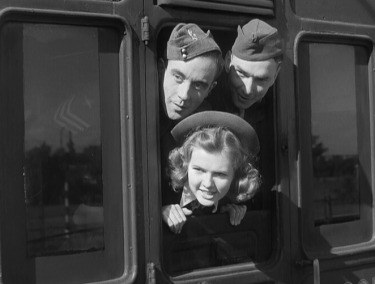
9. A Canterbury Tale (1944, Michael Powell & Emeric Pressburger, UK)
Made in the days of Capra’s wartime propaganda series Why We Fight (1942-1945), whose patriotic spirit spread across the Atlantic to films calling for Anglo-American solidarity, Powell and Pressburger’s A Canterbury Tale (1944) defies tired cliches and patriotic sentiments in its utterly unique rhythm and tone. Taking Chaucer’s classic as an inter-textual framework, A Canterbury Tale focuses on three characters who, on their way to Canterbury, stop at a small village where a mysterious “glue-man” is terrorizing young women who dare to date soldiers. In contrast to most of the wartime productions of the time, Powell and Pressburger’s film turns its gaze from the grandiose to the minuscule, a small village that is unafraid to show its quirky silliness but as such grows into a metaphor for western civilization.
One of the famous director duo’s biggest critical and commercial flops, A Canterbury Tale defies easy classifications. What makes the film unique in a timeless sense lies in its tone and rhythm that are hard to describe. The set-up could mark the beginning of a frivolous farce, and the film is definitely not lost on moments of genuine hilarity, but, as a whole, A Canterbury Tale develops toward the area of peculiar pathos, humanistic tenderness, and profound melancholy. The mythic and the mundane, the romantic and the realist, the everyday and the sublime, the eternal and the transient all find their strange fusion in the film’s rendez-vous of distinct tones, moods, and ideas. Classical studio artificiality gets mixed with on-location authenticity, which is characterized by historical uniqueness as the contemporary spectator realizes that these places are no longer there, creating a tone like no other. In terms of rhythm, the film is always flowing without a hurry, yet never too slowly to announce itself as different or weird. The film’s uniqueness seems so simple, encapsulated in the smallest of things (the co-presence of the past and the present, the smell of the countryside that is imagined through the images, the allure of the any-space-whatevers), but it is so difficult to describe let alone achieve. It must be seen to be believed...

8. Dong (1998, Tsai Ming-Liang, TAIWAN)
The late 1990′s attracted some filmmakers to imagine eschatological scenarios and project them on the big screen. The approaching arrival of the new millennium generated visions of both anxiety and hope, but man’s relentless tendency toward end-of-the-world nightmares drew him closer to the former. These cinematic efforts on the brink of the new millennium usually vary between downright awful (Armageddon, 1998; End of Days, 1999) and surprisingly tolerable (12 Monkeys, 1995), but Taiwanese director Tsai Ming-Liang’s -- who had made a reputation for himself with the understated tale of eroticism Ai qing wan sui(1994, Vive L’Amour), whose final shot in itself might earn its own prize of uniqueness -- Dong (1998, The Hole) shows not only genuine originality and imagination before new times but also a unique tonal combination of both emotions associated with the historic transition: fear and hope.
These emotions are tied together in the film’s thematic nexus of encountering something new, a theme that is treated by Ming-Liang appropriately in an utterly novel fashion. The story takes place in a block of flats in the semi-urban outskirts of a Taiwanese city where people live in quarantine due to the lack of clean water, a problem that has some dire consequences, fitting for the new millennium: without water, people turn into cockroach-like entities that crawl in the dark spaces of moist dirt and dry trash. Two people, a man and a woman, who try to survive in this situation, are united when a hole appears on the man’s floor (being the woman’s roof) due to plumbing renovations. This hole, which is both physical and emotional -- concrete to the point that we can sense its material urgency and abstract to the point that words are not enough to express it -- begins to generate unprecedented intimacy between the two. The characters rarely communicate. At best, they might yell at each other when the woman, the neighbor beneath, finds her ceiling leaking. But there is a more tender connection, one that cannot be expressed by them. In a stroke of charming genius, Ming-Liang uses 50′s-style musical sequences, where well-dressed characters sing Grace Chang’s songs and perform dance numbers that convey the introverted characters silent feelings in a manner that obfuscates more than it clarifies (there is no aha-moment tailored for the spectator). As these musical sequences take place in the same desolate urban spaces where the characters exist, Ming-Liang’s realist aesthetics of the long take, deep space compositions, and a detailed naturalist mise-en-scène of faded colors and flickering lights are challenged by romantic artifice. The space, which turns into its own character, starts dreaming. It dreams of becoming something else, somewhere else, far and away, safe from the arrival of the new.
As the world prepares for never-before-seen destruction, the holes in the characters’ souls become tangible in the form of a narrow gap, not only the grey chasm between the two apartments but also the distinction between these two diegetic dimensions (the world of song and the world of silence). As the new both anxiety-inducing and hope-awakening millennium approaches, the two characters encounter love, something they had not expected, something they had forgotten, something that appears in a totally unprecedented form -- to them as well as to us, the audience. This unique story provides us with an interlude to reflect. Where are we going? New times are coming. We can always look back to the past. We can find solace in its embrace. What is collapsing? What can be recovered? What will the abyss of the hole engulf? And what will it bring about in times of chaos? A new connection, a new intimacy, a new cinema?
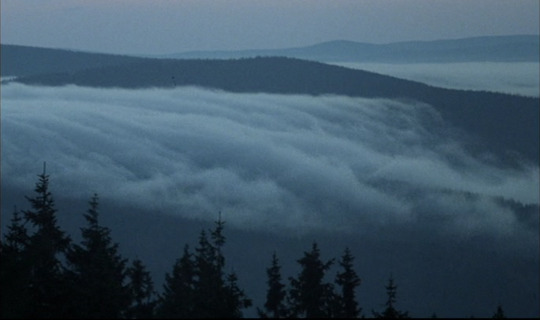
7. Herz aus Glas (1976, Werner Herzog, GERMANY)
Shot mainly in director Werner Herzog’s home environment of Bavaria, accompanied with gorgeous landscape shots from all over the world which still merge with the same central milieu, as well as Popol Vuh’s score, Swiss yodeling, and medieval music, Herz aus Glas (1976, Heart of Glass) is the shining ruby in Herzog’s prolific yet familiar oeuvre. Although Herzog is often celebrated as an eccentric filmmaker whose cinema constitutes an entirely unique thing of its own, his films are usually quite clearly connected to one another, and one knows what to expect from them (which is also a compliment to Herzog’s auteur caliber). Herz aus Glas, however, brings a breath of fresh air into a catalog that already seems to be as fresh as fresh can be. It is definitely the film that sticks out. No other Herzog film employs his unquenchable desire to pursue new profound images as strongly and startlingly.
The story concerns a Bavarian town in late 18th century whose main source of income comes from blowing a rare type of ruby glass. When the secret of the ruby glass passes away with the town’s deceased master, a prophetic seer from the hills descends to the townspeople and foresees their destruction. To anyone who has seen the film, it is quite clear that the story is secondary to the film’s strange, private discourse which might be better left unanalyzed since its mere verbal description seems to aggregate an insult at worst and a failure at best.
While there are certainly more than one factor which explain the film’s incomparable uniqueness (the presence of seemingly unrelated landscape shots as an additional level of discourse, the ambiguous story as well as its elusive structure, the extremely stylized mise-en-scène that creates a sense of alienation and distance), the raison d’être for the film’s reputation obviously derives from Herzog’s exceptional decision to shoot the whole film with the actors under hypnosis. Consequently, the film is rife with images of hypnotized people who stare very attentively at something in the off-screen space -- something, an object, a sight, an event, something that remains a mystery to the hopelessly unaware spectator. In the physical space, the actors are obviously looking at something Herzog the hypnotist has guided them to look at, but in the diegetic space, the characters are looking with great attention and focus on their pre-determined doom. Their focus is startling because, despite their attentiveness, they do nothing but walk towards their demise. This works because, though pre-determined, their doom is indeterminate in the sense that they cannot really make any sense out of it. A stroke of genius on Herzog’s part, this heavily stylized acting turns into a metaphorical framework for a community which is under collective hypnosis heading out to the horizon of destruction with a sense of blind determination.
The film is totally alienated from classical story-telling, and many of its scenes take place in spaces which we might see only once and whose relations to the rest of the spaces remain unclear. Mapmakers of fictive worlds, beware. They are places which Herzog remembers from his childhood, or places which he has imagined for his past or future. There are many elements which would annoy the regular movie-goer from the slowly developing cry of a woman as she witnesses two seemingly dead men on the ground to the inexplicable bursts of laughter from the old man. There are plenty of scenes which seem to serve no clear purpose. There is a scene where a painting falls from the wall behind a man after which he tries to lift it, fails, and then returns to his original posture as if nothing had happened. There is also a sequence shot of a glassblower making a glass horse out of the melt matter. This scene has no obvious meaning in the film, nor should it; the shot is just there. It is there for us to marvel at it and to reflect on the beauty of craftsmanship, the art of glassblowing.
If the quest of Herzog’s cinema is to always look for new images, then Herz aus Glas delivers more than any of his films. One of the many peculiarities of the film are the recurring landscape shots from all over the world which remind one of Herzog’s brilliant documentary Fata Morgana (1971). These landscapes might be the visions of the attentively looking townspeople or not. As such, they might be images of destruction, of the end, or of the beginning -- or not. They might be an imagined landscape of origins. My personal favorite is the shot, which has been done mechanically by a frame-by-frame technique, of a river of clouds on the top of a forest. There is an enchanting mystique to this hypnotic image. When we look at it, we might think that it is about something, but we should not make the mistake of trying to explain what that something is. Nor should we find an external point of reference to call it a metaphor for something else. We should embrace its mere cinematic aboutness.
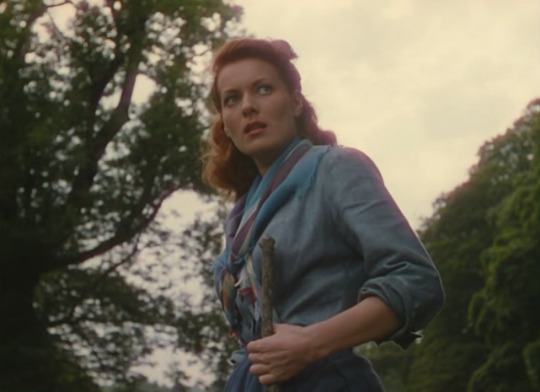
6. The Quiet Man (1952, John Ford, USA)
John Ford, the man who made westerns, is to modern America what Homer is to ancient Greece. Beyond the genre of lonely travelers in the wild west, Ford took his cinematic myth-making to other worlds. They Were Expendable (1944) provided the first signs of Ford’s unadorned and unsung sensitivities beyond the desert, which, after initial opposition, he was able to appreciate (sort of) after Lindsay Anderson pressed him on the emotional depth of the film in his celebrated interview book. The real deal when it comes to Ford’s hidden personality, his artistic ambition, and his aesthetic sensitivity, however, is The Quiet Man (1952), a film like no other if there ever was one. It is a unique, poetic fable of pastoral idyll, understated modern anxieties, battling dialectics of reality and fantasy.
A classical love story where a man, Sean Thornton, played by Ford soulmate John Wayne, returns to Ireland from America where he falls in love with Mary, played by Maureen O’Hara, The Quiet Man is like an idyllic postcard, a tale of the fantastical countryside that is presented in an overly romanticized fashion. Its humor, varying between masculine slapstick and battle-of-the-sexes screwball comedy, would make the advocates of the me-too era cringe. However, I believe that Peter von Bagh was right in seeing the film as greater than life. To him, its scenes of love carry “metaphysical might.” [3] There is more to them than the eye can see. When Sean pulls Mary away from the door opened by ferocious wind to kiss her for the first time, there is a sense of baroque awe as Mary’s hems bend against her rigid legs in a gust of divine wind. Perhaps telling of its uniqueness, the film’s closest kindred spirit seems to be a film that looks totally different, Murnau’s Sunrise (1927), which carries similar “metaphysical might.”
The Quiet Man was not received well during its initial release. Its fable-like illusions threw away all hopes of Ford’s return to the realist cinema of Hollywood he helped establish in the late 30′s and early 40′s. The far landscapes of the wild west were replaced by a postcard idyllic Irish village of Inisfree where trains are late, chores can be put on a halt to chit-chat, and traditions persevere. From the beginning locus amoreus of a boat by lakeside at dusk to pastoral iconography of a redhead shepherding sheep, a priest fooling fish, and drunkards playing the accordion, The Quiet Man is Irish pastoral of 50′s American optimism. Despite the film’s idyllic nature and the romantic mise-en-scène that gives birth to it, one would be making the mistake if one concluded that The Quiet Man was completely lost on realism. “Inisfree is far from heaven, Mr. Thornton!,” reminds one character. It is rather that in it Ford manages to find a totally unique combination of realism and romanticism, the modern and the traditional, the American and the Irish, in a fashion that reminds me of Brontë’s Wuthering Heights (1847). Sean escapes America, the land of freedom and opportunities, to his home country of Ireland. Although never stated explicitly in the film, one can see a social undertone, as noticed by von Bagh: during the Korean War, which was still going on, disillusions scattered throughout America. Inisfree’s distance from heaven might be lost on Sean’s nostalgic eyes, but he seems to imply something about the looming vicinity of realism to us when, upon seeing Mary for the first time, his yet undiscovered love interest and wife-to-be, he states: “is she real?”
It is, in fact, this scene, this first encounter between the lovers-to-be, that always gets me. Its uniqueness escapes words. The scene begins with a long full shot of Mary amid sheep, which is motivated as Sean’s point of view shot as the scene progresses. There is a cut to a low-angle medium shot of Mary, which is followed by a reverse shot of Sean and then another low-angle medium shot of Mary, as she slowly vanishes beyond the frames of the screen space. A return to the long full shot of Mary amid sheep is followed by a medium shot of Sean. Dumbfounded, amazed, looking afar, and hopelessly in love, he says: “Is she real?” Ford’s brilliant choices in montage and shot scale articulate the distance between the characters, which will be a recurring theme in the film -- “There’ll be no locks or bolts between us, Mary Kate!” -- while also bringing them in close intimacy that still remains a mystery to both of them. There is a heavenly feeling to all of this. Where are we? The modern Sean, escaping the disillusions of 50′s American optimism, might be asking himself: “Is this -- Inisfree -- real?” We, the viewers, we, the lovers of the film, we, the lovers of cinema, might be asking ourselves: “Is this -- The Quiet Man -- real?”

5. Tini zabutykh predkiv (1964, Sergei Parajanov, USSR/UKRAINE)
Ukraine-born director, Sergei Parajanov’s breakthrough film Tini zabutykh predkiv (1964, Shadows of Forgotten Ancestors) is on fire. It is on fire like a mixture of jazz and opera, a blend of ancient epic and modernist poem, a mishmash of waltz and jitterbug that never, for some odd unfathomable reason, feels haphazard. It feels eternal, timeless, and archaic, but, at the same time, contemporary and modern. The truly marvelous thing about all this is the fact that the story itself is a fairly traditional love story. Ivan and Marichka, whose families are rivals by heart, fall in love at a young age. After Marichka drowns in an accident, Ivan falls into depression but then remarries. In his new life of work and dull everyday chores, he is tormented by the memory of his first love. In the end, he dies either due to a hit from a sorcerer, who has made passes at Ivan’s new wife, or due to his incurable loneliness in a void universe without love.
Such a classical romantic tale acquires an unprecedented energy from Parajanov’s cinematography that is characteristically free and mobile -- in stark contrast to that of Sayat Nova (1969, The Color of Pomegranates), the director’s best-known film. The handheld camera is always on the move. It does not shake in the sense that the contemporary spectator has become accustomed to identify “handheld camerawork;” in fact, it can be very steady at times, but it moves quickly and ferociously. It pans so fast from one place to another that the eye does not register the spaces between the two steady screen spaces before and after the pan. It can appear to be fixed on a spot, but then it starts gliding or flying as in the amazing shot of Ivan lying on the large raft on the river. Watching the film unfold on the big screen is like having your head dislocated in some strange non-physical sense. One might think that such energy is distracting and makes one pay too much attention to the cinematography. The effect, however, is the opposite. It’s hypnotic. Everything feels intuitive and natural. One simply feels bewildered before this film to the extent that one starts imagining new images to the film. It is as if the camera found freedom and was liberated from its physical ties, becoming a disembodied eye whose movements are impossible to be predicted. The spectator never knows where the camera is going to move next, what the next angle will be, or in which scale the next shot shall be.
As such, the camera turns into a lyrical speaker of a poem or a stream-of-consciousness narrator of prose who identifies with the characters’ experience that cannot be accessed unambiguously. The most obvious example is not surprisingly the use of point of view shot when Ivan’s father is axed to death: red blood fills the screen, which is followed by a strange image of red silhouettes of running horses. Less obviously subjectivized stylistic decisions, where the camera identifies with characters’ experience, include the beginning scene where there is a “point of view shot” from a falling tree’s perspective, which is followed by a hypnotic spin of the camera as though it detached from material reality after a character dies under the tree. During the first embrace of Ivan and Marichka, Parajanov’s camera keeps the characters in focus and in a tight medium close-up, but the intimacy is complicated by implied visual distance: the use of the telephoto lens coalesces multiple layers of tree branches and other flora as a soft, flat veil enfolding the lovers in their natural innocence as the camera encircles them in eternity. When Ivan falls into depression after Marichka’s death, not only are the colors replaced by a surprising shift to black-and-white but also the movement of the camera becomes significantly calmer and slower. When Ivan starts feeling the presence of the dead Marichka -- as a ghost, as a memory -- there is a series of jump cuts showing Marichka behind Ivan’s window, rather than a return to the previous stylistic program. All of these exemplify cinema’s ability to subjectivize without the use of point of view shot or voice-over. Parajanov realizes this potentiality beautifully and uses different cinematic means without restriction but never without a consistent vision.
There are shadows from the past which obstruct Ivan and Marichka’s innocent love, but there are also shadows from the new past which prevent Ivan from moving on with his life. In an unforgettable scene that is still unparalleled in film history, Marichka’s ghost entices the delirious Ivan, recently struck by the sorcerer, to death in a wintry forest. Both characters move toward each other, but they do not seem to be walking in the medium shots that only show their heads moving against the background of the white forest as their voices sing a song of love without their lips moving. There is a strange sense of movement and ceased time. There is a touching sense of the wonderful yet painful grip of love. There it is, unshadowed, unforgotten, now.

4. Sud pralad (2004, Apichatpong Weerasethakul, THAILAND)
In terms of mere structure, this film is bonkers. Hardly ever has a film dropped as many jaws as Thai director Apichatpong Weerasethakul’s breakthrough feature Sud pralad (2004, Tropical Malady) during its initial festival release. At first glance, it might be tedious, it might be irritating, it might be, well, just too mysterious. It might feel too private. As one allows the images and the sounds to sink in, however, this masterful, dualistically structured film starts to make sense like Lynch’s Mulholland Drive (2001). Even more so than Lynch’s, I believe, Weerasethakul’s film is one of the best and most unique films ever made about love.
What begins as a love story between two men, a soldier and a country boy working at an ice factory, ending in an unexplained break-up, suddenly turns into a silent fable about a shape-shifting shaman and a soldier. The second part can be seen as an allegory for the first -- or vice versa. They comment on one another. They are co-dependent. They are lovers. There isn’t one without the other. What is more important than the logical connections between the two parts (one can either see them as flip sides of the same story or as a continuous story in the same fictive world) are their sensual and emotional resonances. Being a love story, the film’s English title (which is not a direct translation, one might add) already suggests a peculiar vision of love: not as a cure or as a utopia but as a malady, a sickness, something that consumes one’s body and soul. As the two men separate, they first devour each other. There is a sense of mystery in the air. What happened? Exactly. Who knows. Who’s to say?
Since their feelings -- both in initial infatuation and in the out-of-the-blue separation -- cannot be explained in words, they are articulated by the fable. The soldier is being consumed by the shaman, he is dying because of him, but he is also dependent on the shaman and must approach him. As the shaman shifts into a tiger, the aspect of consumption becomes poignantly discernible. Weerasethakul uses many lingering shots in the dark forest that suggest a fluctuation between the two characters. There is movement in the screen space, but is it the soldier or the tiger? They finally face each other in a bigger-than-life scene of intense stares that will haunt you for an eternity. The stare of the tiger occupies the screen space, dominating, hypnotizing the audience. There’s a strange sense of fear but also of lust; there’s an inexplicable desire to surrender as the malady takes over. Weerasethakul’s long take allows the tiger’s stare to sink in, to drill down to the spectator’s spine where its sensuous force begins to fester. The moment of devouring is at hand. This scene breaks hearts and sews them back together.
Weerasethakul’s inimitable cinematic discourse, which operates on the immediate level of senses and sensations, uncovers animals and other natural entities in their own right, as they appear, rather than as conventional metaphors for something else. They are embraced as the Other. Indeed: Sud pralad is a film about primordial otherness of everything else beyond oneself, a theme that Weerasethakul tackles by telling a love story. Because in love one experiences otherness most intimately but also most painfully. One might be very close to the other, but one also experiences the growing distance. One must confront the insurmountable challenge to understand the other. There is one’s own mind to keep one company, and then there is the rest of the world. There is the man devouring one’s hand and then going away for good. There are street lights in the night. There is music in the air. There is a sense of heartrending wonder. There is the intensely staring tiger ready to devour the one. And there is the one ready to take the plunge.
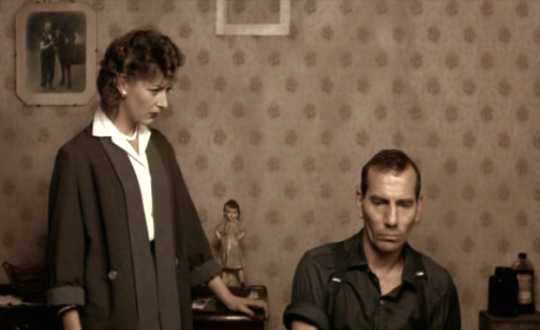
3. Distant Voices, Still Lives (1988, Terence Davies, UK)
By its enigmatic title alone, Terence Davies’ heavily autobiographical film Distant Voices, Still Lives (1988) invites expectations of originality, and those expectations are not disappointed to the slightest. The ambiguous title is rife with meaning, but at the most direct level it works as a structural point of reference since the film is distinctly divided into two separate parts. A story about a working-class family living in Liverpool, the film’s first part, “Distant Voices” focuses on the power the family’s father has on their co-existence in 1940′s, while the second part, “Still Lives” portrays the lives of the children in their early adulthood in the 1950′s -- away from the presence of the war but still far from the new youth culture that was about to emerge. Under the father’s abusive influence, they cried and sang in a bomb shelter; now, safe from heavy rain in a cinema, they cry as they watch Henry King’s Love Is a Many-Splendored Thing (1955). This is but one parallel in a film where things get entangled, where popular culture, communal singing, historical events, universal themes, and extremely personal memories fuse in an unprecedented network of cinematic thinking.
The peculiar two-part structure, made striking by the two-year gap in production and inevitable change in some of the crew, would be enough to mark the film as singular, but this narrative division is only one element in an idiosyncratic whole that constantly draws the spectator’s attention to the artificial nature of the cinematic representation in question. The film’s narration itself is self-aware to the extent that the spectator inevitably pays attention to it: the non-linear representation of past events in an order that seems associative at best is bound to make the spectator ponder representation. Davies thematizes representation or, more accurately put, memory, its mechanics, and the possibility of representing and remembering. On an immediately stylistic level, Davies employs heavy use of light coming from an off-screen source as well as over-exposed light in the screen space which, together with the pale and tainted colors that filter every image, give a peculiar, golden hue to the sepia-like, nostalgic mise-en-scène reminiscent of scuffed photographs. The cinematography, which varies between utter stillness and slow pans and dolly shots, often gives a strong impression of tableaux vivants from early cinema, which remind one of old family photographs. The same goes for the film’s strikingly exact and centralized compositions: never has a symmetrical two-shot felt this precise and powerful, static and dynamic at the same time -- artificial and proud of it.
On both levels of narration and style, Davies draws the spectator’s attention to the artificiality of everything: that all this has been “produced” -- structured and conditioned by a mind that is reminiscing something. That something belongs to a world that no longer is, and that never was just like this. It is an utterly unique world that is only here and now, in the moment one is watching this film and remembering it in their own mind. There is a sense of discipline and order which always leave something outside, making it absent, outside of memory’s reach, while encapsulating something, making it present, within memory’s constituted and conditioned sphere. On both levels, Davies’ film is strongly characterized by elements of distance and stillness as his filmic portrayal of family leaves his characters relatively distant, beyond our absolute reach, in picturesque mobile paintings that invite us to reflect what lies beyond their frames of stillness and distance, sight and sound.
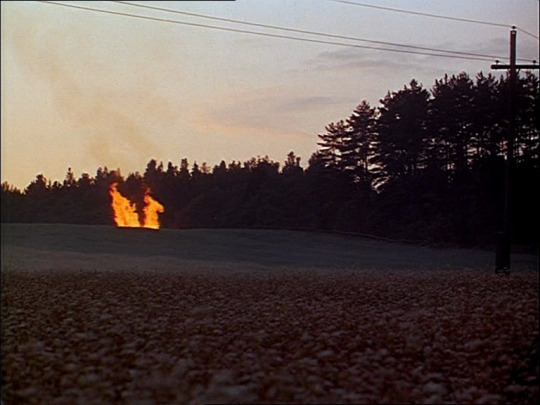
2. Zerkalo (1975, Andrei Tarkovsky, USSR)
It’s nothing. Everything will be alright. Everything will be...
A monumental yet intimate masterpiece of memory, undoubtedly the best film on this list, if not simply the best film ever made, and one of the few films I have seen more than ten times, Andrei Tarkovsky’s most personal film Zerkalo (1975, Mirror) is beyond flawless. Like Bresson, Tarkovsky certainly has a very distinctive oeuvre that feels consistent in its stylistic unity, but there is something intensely singular about Zerkalo that elevates it above a body of six other masterpieces or fringe-masterpieces. Some directors have tried to follow Tarkovsky in creating their own mirrors, but none have achieved either the same level of quality or of uniqueness. The beautiful thing about the film is, and this is key to its uniqueness as well, that Tarkovsky manages to bring the private to the public (not only by juxtaposing his own experiences with Russian history but also by uncovering the universal structure in human experience) without ever coming close to sacrificing the innate privacy of some of his images at the altar of effortless intelligibility.
The first time viewer is bound to be confused by the enigma. In the course of repeated viewings, however, the fuzzy reflection begins to take shape. A dying poet recalls his life which unfolds in sequences that take place in three different time frames: his childhood in the early 30′s, his adolescence during WWII in the early 40′s, and his parenthood in the late 60′s. He ventures into the abyss of his suffering as well as that of his nation and humankind in general, but, in the midst of pain, a vague promise of peace is discovered. Mixing archival footage with traditional scenes of dialogue on different time frames, reciting poems and playing music, using oneiric images as well as concrete motifs of mirrors and fire, juxtaposing colors with sepia and black-and-white, Zerkalo coalesces the personal with the collective and the dreamlike with the material. It creates an unparalleled rhythm that has an eerie, otherworldly feel to it, which, nevertheless, feels so intimately tied to nature and sensation that one can almost touch it. But when you reach your hand toward the mirror, it once again reveals its elusive shape that escapes your grasp.
In its stream of impressions and ideas, the poetically flowing narrative of Zerkalo works as a lucid parable of the human mind. The mere viewing experience of the film works as a cheap form of psychoanalysis for some. Film scholar and programmer Antti Alanen calls it “a space odyssey into the interior of the psyche” [4]. The ambiguously focalized narration flows in ways which resemble free association. There is an event and there is another; there is an image, then a sound; there are pauses and gaps, inexplicable connections of heart and soul, lines drawn by a tormented mind trying to comprehend and grasp something that, as he himself puts it, cannot be expressed by words. From grand sights such as the collapse of the house and the flight of a bird through a window to tender details of a human hand before a flame, a redhead with a blistered lip in the snow, and a cut from one gaze to another, the film’s narrative flow follows a logic of its own, a logic on a higher level, a logic that feels consistent but cannot be laid out in non-cinematic terms. To some, there is spiritual force in this, the power of both the subconscious and the Hegelian Weltgeist traversing across the images.
Zerkalo tackles questions that are no less than the biggest but also the simplest in life: What is human life? What is its meaning? What is its meaning to us as individuals and as mankind? Why and how is it experienced as meaningful? There are no answers, there is no great revelation, and how could there be, but there are little junctures of awe, touches with the world, small manifestations of fire before us. The protagonist’s ex-wife wonders why something like the burning bush never appeared to her. We might wonder the same. In Tarkovsky’s mind, it seems to me, this is due to the loss of connection to something transcendent to us and our petty affairs -- not necessarily to god but perhaps to nature, to values as such, to what really matter, to our primordial origin. Or, perhaps, more modestly, there is a loss of connection to the mirrors around us, manifesting as the inability to accept bewilderment and live in lack of comprehension. The film is full of moments of such transcendence: the bird landing on the boy’s head in a strikingly beautiful composition of Brueghelian proportions, the massive gust of wind blowing over the departing man on the serene field after a chance encounter, the mysterious fall of an oil lamp from the table on the wooden floor, and the disappearance of a faint ring stain on a table as the lady vanishes. What are these magical moments, these manifestations of burning bushes, other than Ereignisse that ask us to accept irrationality, to look into the mirror and marvel? The great revelation to the big questions might never come, but the reflection on the mirror keeps getting clearer only to be beclouded again and vice versa.
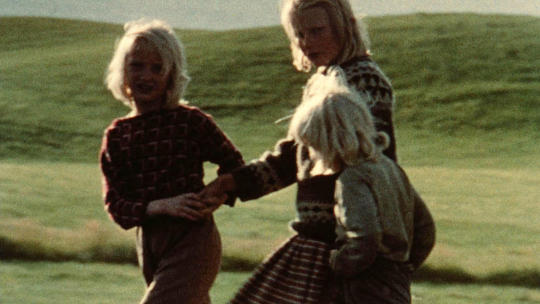
1. Sans soleil (1983, Chris Marker, FRANCE)
Contrarily to what people say, the use of the first person in films tends to be a sign of humility: all I have to offer is myself. [5]
These are the words of Chris Marker. A private recluse, a documentarian, a poet and a reporter of the cinema, Marker escapes easy classification. The creator of the most unique short film La jétée (1962), Marker is also celebrated as the father of subjective documentary. After making what is most likely the best depiction of the political turmoil in the second half of the 20th century in Le fond de l’air est rouge (1977, A Grin without a Cat), Marker turned inward -- or did he? -- in the pioneer piece of whatever you want to call it, poetic essay film or subjective documentary, Sans soleil (1983, Sunless). “I could tell you that the film intended to be,” Marker affirms, “and is nothing more than a home movie. I really think that my main talent has been to find people to pay for my home movies.“ [6]
Anybody can make home movies, and everybody does in these pathetic days of YouTube vlogging, but only Marker can make home movies that are simultaneously ultimately his and ultimately ours. A home movie for the ages, Sans soleil tackles the perennial topic of French cinema (think of the whole oeuvre of Alain Resnais), the difficulty of memory, which has both individual and social implications for the representation of the past. In the beginning, there is an image of children in Iceland. Happiness signified. Is this a memory? Images signifying a happy childhood memory, any-memory-whatever. “How can you remember thirst,” asks the man behind the camera, whose letters the female voice-over, the alleged receiver of these letters with an alleged sender, another disembodied character like the man, reads out loud.
Marker’s Sans soleil does not develop ordinary motifs or conventional techniques in dealing with memory. No matter how innovative -- and groundbreaking -- Resnais’ methods are, they are no match for Marker’s meta-approach. Rather than thematizing memory with a device, Marker deals with the theme through itself, by trying to remember it, by trying to become conscious of itself. The man wonders how have people been able to remember anything without pictures. Pictures are the memory. Montage is the memory. Viewing the film is memory.
While timeless, Sans soleil is also absolutely a film of its time. It comes right out of the postmodern era when man’s relationship with history, time, memory, and space was challenged on all fronts of human thought and creativity. The history of the documentary film is filled with numerous travelogues -- from the ghost train films of early cinema to Flaherty’s Nanook of the North (1922) and Wright’s The Song of Ceylon (1934) -- but Marker’s Sans soleil challenges the whole possibility and meaningfulness of the travelogue. In his mind, in the mind of Sans soleil, time and space cannot be conveyed over individual, experienced knowledge. The poetic narration of Sans soleil constantly turns to itself and challenges its representation. The film consists of shots, which are more or less separate from one another, that are organized by the letters read by the woman, letters that she has received from a man, the man behind the camera. Thus there is a double focalization, the word and the image. When the levels of the image and the words of the letters occasionally coincide, the spectator is tempted to think of the images as shot by the man from his point of view, but Marker’s film seems to escape such an easy way out of the puzzle. Marker takes man’s relationship with history and the past by dealing with the relation between real and reconstructed memory. Is there a difference? Is there a difference between our collective history and our personal histories? Is there a difference between a home movie and a movie? Is knowledge of the world possible?
We know little of Marker’s private life. His most private and personal film, Sans soleil, perhaps paradoxically, adds nothing to this lack of knowledge. In a strange way, it achieves an extremely intimate level by creating a peculiar distance. It hides behind images and words. We never see the central characters. We see reconstruction. We see implications. We see conclusions without premises. We see the end of the road but not the road.
There are no clichés in Sans soleil because it is beyond the definition of cliché and convention. The man behind the camera has seen so much that at the moment only banality interests him, as he states in a letter. The unique and the original have become dull. The banal is the new unique. He preys banality like a bounty hunter. In this quest, banality turns into something else -- or does it? In a synthesis of banal moments, the montage of images becomes its own living thing.
A filmic version of stream of consciousness, the only structure of Sans soleil is its lack of structure. There is fragmentation on both the level of the whole and the level of the part. The words stop and random notes put a pause on a flow that, for a moment, seemed to have a clear structure. “By the way, did I tell you that there are emus in the Île de France?” The images freeze, the words stop, the images continue, the images give rise to a continuation into an unprecedented series of separate images. Yet, despite all of this, the film has a rhythm like no other, and it never feels scattered. It is cohesive on another level. It follows the unknown logic of its private internal auteur. Sans soleil is not remembered for its words nor for its images, but for the synthesis of it all -- and, most importantly, the impressions and feelings that arise from this synthesis. We do not remember individual shots, individual sentences, or at least we do not think of them. We remember the film.
I remember the cut from the Japanese dancing to an emu. I remember the abrupt cuts from the serene desert to the chaotic Hong Kong. I remember the cats in the temple. I remember. I remember the electronic sounds accompanying swans in a lake. I remember the counterpoint. I remember the tension, the voltage, the trance of it all. I remember the lack and the absence. I remember the presence and the richness. I remember the unique, the one and only, Sans soleil, the distant voice that both fades and stays in memory.

Some runner-uppers, or the mandatory honorable mentions: Stanley Kubrick’s Eyes Wide Shut (1999) and 2001: A Space Odyssey (1968), Woody Allen’s Zelig (1983), Jean Vigo’s L’Atalante (1934), Dziga Vertov’s Chelovek s kino apparatom (1929), Souleymane Cissé’s Yeelen (1987), Leos Carax’s Mauvais sang (1986), Luis Buñuel’s L’Age d’Or (1930), Atom Egoyan’s Exotica (1994), David Lynch’s Dune (1984), Frank Perry’s The Swimmer (1968), Edward Dmytryk’s The Sniper (1952). Charles Laughton’s The Night of the Hunter (1955).
Notes:
[1] Truffaut, François. 1984. Hitchcock. Revised Edition. New York: Simon & Schuster Paperbacks, p. 239-243.
[2] Bordwell, David. 2018. Reinventing Hollywood: How 1940s Filmmakers Changed Movie Storytelling. Chicago: Chicago University Press, p. 220.
[3] Bagh, Peter von. 1989. Elämää suuremmat elokuvat [Films Bigger Than Life]. Otava, p. 405. My own translation.
[4] https://www.bfi.org.uk/films-tv-people/sightandsoundpoll2012/voter/785.
[5] https://chrismarker.org/chris-marker/notes-to-theresa-on-sans-soleil-by-chris-marker/.
[6] Ibid.
1 note
·
View note